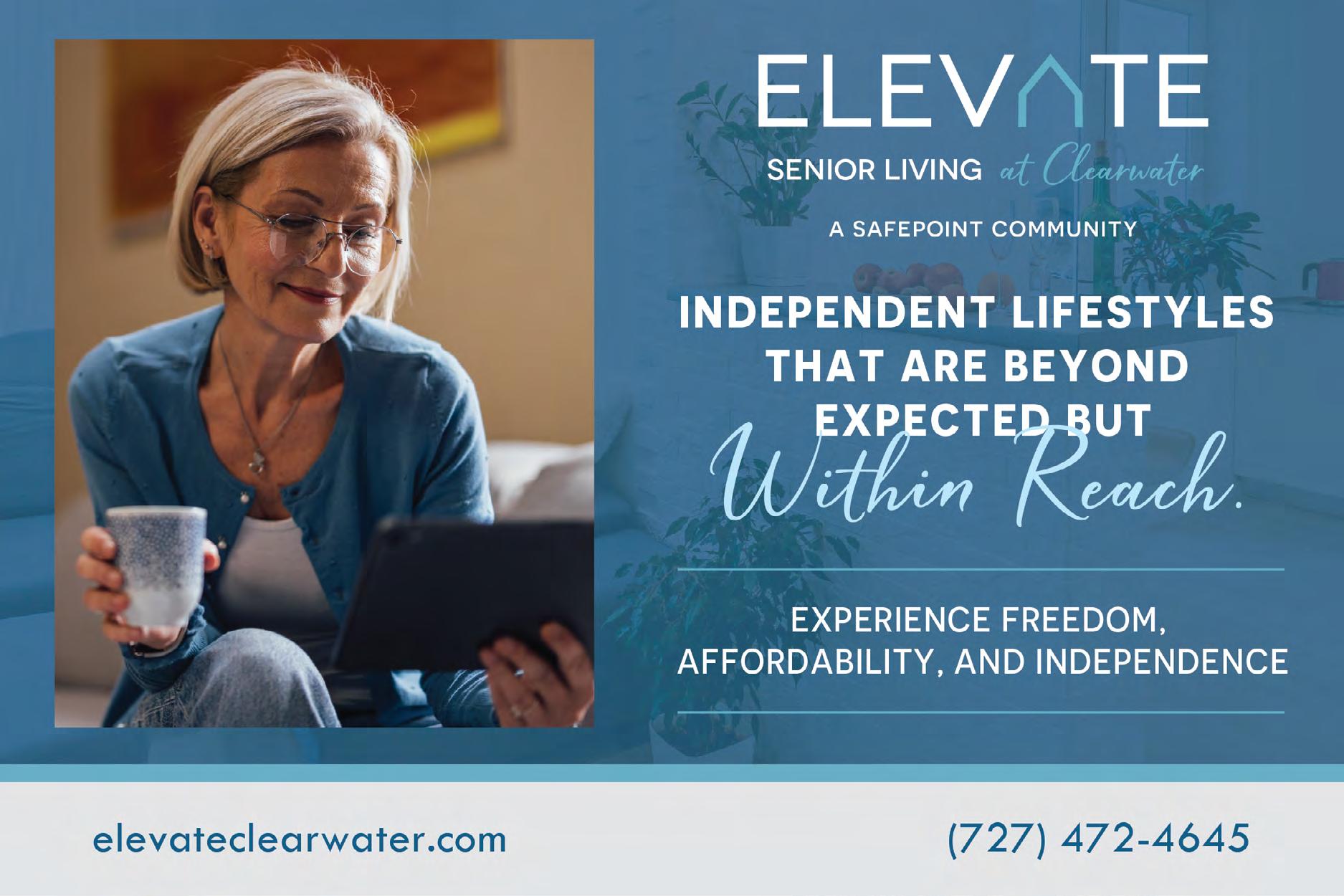INDUSTRY PARTNER OF THE YEAR
MAKING SIGNIFICANT STRIDES IN THE ALF INDUSTRY




CONFERENCE PROGRAM INSIDE








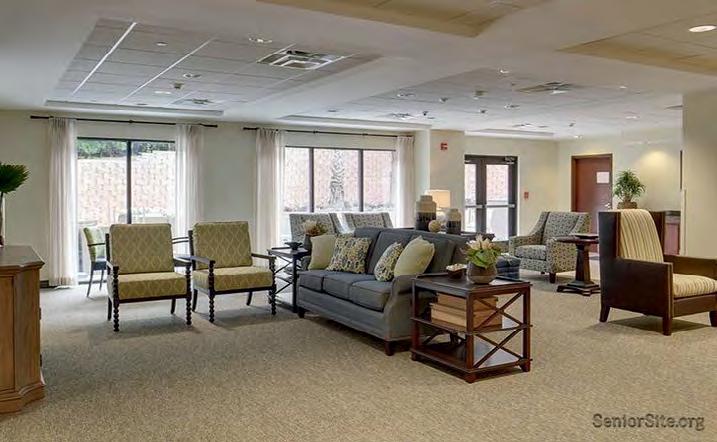




INDUSTRY PARTNER OF THE YEAR
MAKING SIGNIFICANT STRIDES IN THE ALF INDUSTRY




CONFERENCE PROGRAM INSIDE












It is with immense pleasure that I welcome you to the special Conference edition of the Florida Senior Living Association quarterly magazine, brimming with anticipation for our upcoming gathering in the heart of our beautiful Florida! As we gather under the warm sunshine in Orlando, this year’s conference promises to be a landmark event. Here, we'll not only reconnect with colleagues and friends but also delve into the most pressing issues facing senior living communities today.
As chairman of the Florida Senior Living Association Board of Directors, I'm thrilled to welcome you to this exciting event, themed to celebrate the vibrant spirit and boundless potential that flourishes within our communities. This conference isn't just about learning – it's about connecting. Network with fellow professionals, share best practices, and create lasting collaborations. After all, the "wild side" thrives on a spirit of community and shared purpose.
The annual Conference, July 10-12th at the Ritz-Carlton Orlando, is your chance to embrace the wild side of senior living with us! Engaging panel discussions and breakout sessions will foster a dynamic exchange of knowledge in the senior living industry. With engaging events including the return of the annual Chef’s Competition, a Junglethemed fun night complete with a spectacular live band, a cornhole tournament, and two reverse trade shows for FSLA Industry Partners, everyone will have the opportunity to network alongside fellow members while sharing successes and learning from mutual challenges. Together, we can shape the future of senior living in Florida, ensuring it remains not just a place of care, but a vibrant hub of lifelong learning, exploration, and personal fulfillment to benefit the residents we serve.
The Florida Senior Living Association team & Board of Directors can’t wait to see you there.
joe jedlowski, mba/mha President, Distinctive Living
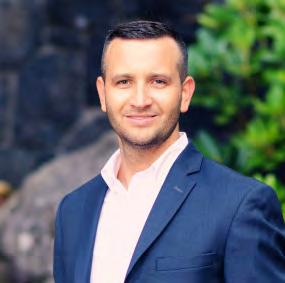









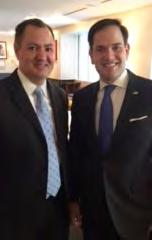
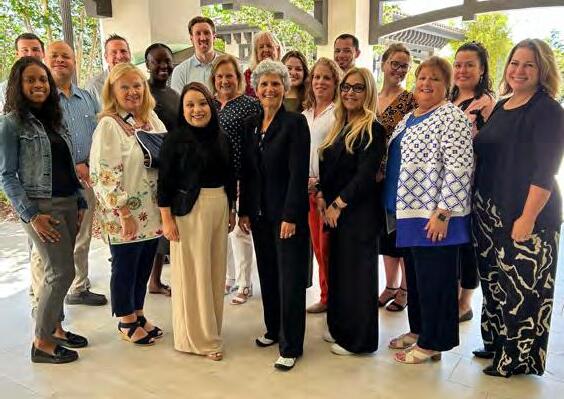
FSLA STAFF
Gail Matillo, MPA
President & CEO
Jason Hand, Esq. COO & General Counsel
Kristin Quirk, MS
Membership & Partnership Director
Katherine Upton
Education & Engagement Director
Executive Editor, ENGAGE Magazine
Jimmie Fay Griffin, LPN Accounting, Membership & Regulatory Manager
FSLA EXECUTIVE BOARD OF DIRECTORS
Chair: Joe Jedlowski, MBA/MHA President and CEO
Distinctive Living
Immediate Past Chair: Shelley Esden
President and CEO. Lexor Senior Living Past Chair: Melinda Skirvin
Vice President. Five Star Senior Living
Past Chair Emeritus: Mary Sue Patchett
Secretary: Page Ensor
Regional VP of Operations. Brookdale Senior Living
Treasurer: Lindsey Hacker
Founder & CEO, ProVisio
Parliamentarian: Robin Khanal, Esq. Partner, Quintarios, Prieto, Wood & Boyer, P.A.
Industry Partner Committee Chair: Matt Depenbrock
Director of Business Development
Guardian Pharmacy
Education Committee Chair: Marisa Strain
Chief Clinical Officer, SRI Management
FSLI Chair: Gwen Thibault
Divisional VP of Operations
Legend Senior Living
Membership Committee Chairs: Damon Thomas & Heidi Kuchenbacker
Legislative & Regulatory Committee Chairs: Joe Signore & Tara Clayton
Editorial and Business Offices 2292 Wednesday St. Suite 1 Tallahassee, FL 32308 850-496-2562 | floridaseniorliving.org
Publisher: Gail Matillo gmatillo@floridaseniorliving.org
Executive Editor: Katherine Upton kupton@floridaseniorliving.org
Creative Director: Katie Truelove ktcreative@me.com
Advertising & Editorial Submissions engage@floridaseniorliving.org
By Jason Hand
Assisted living communities are, unfortunately, adapting to the “new normal” of negative lay media attention and calls for increased federal and state oversight. As noted by FSLA’s national partner, Argentum, the industry sits “on the precipice of this defining moment with significant challenges but also tremendous opportunities” to tell its story and help residents live their best years in assisted living communities.

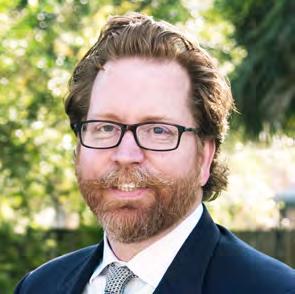
jason hand COO & General Counsel Florida Senior Living Association
Unfortunately, prospective residents, families, and even lawmakers generally don’t understand the value, compassion, and service that assisted living communities provide. This is a tremendous opportunity. We – including your own community - must step into the role of educator and share with lawmakers and others how assisted living delivers high-quality services, care, and experiences to our cherished residents and their families.
FSLA is the trusted voice before the Florida Legislature regarding assisted living in Florida – after all, this is why the association was created. However, legislators ultimately want to hear from YOU because YOU have the best perspective to convey how these issues impact YOUR business, YOUR employees and YOUR residents.
FSLA and our senior living industry desperately need assisted living communities to host visits. Telling lawmakers your story about the value of assisted living, the impact on the lives of the seniors you serve and their families, is an opportunity to put a “face” to assisted living communities. This direct input from you, your employees, and your residents, helps lawmakers better understand the challenges you face and see firsthand conveying why strengthening the senior living model is so important to our nation’s aging population.
Reach out to FSLA to learn how we can help you tell YOUR story!
We work hard for Providers, Staff and Residents! With your support and membership, together we can continue making an impact!

with FSLA's Leadership Team
we asked, Gail and Jason answered
Gail, what did you enjoy the most about interviewing Ms. Jane for the cover shoot?
I genuinely enjoy meeting and connecting with the residents and hearing their stories. It is such an honor to learn more about them and know that FSLA and our partners are helping them live their best lives possible!
NAME
FAVORITE SEASON OF THE YEAR?
Spring - the season for warmer weather, renewal, growth & new beginnings
WHAT IS A HIDDEN TALENT OR HOBBY THAT YOU BRING TO YOUR WORK?
Being Persuasive - it has helped me build credibility and achieve goals
WHAT IS THE BEST PIECE OF ADVICE YOU'VE EVER RECEIVED?
When you surround yourself with people who share a commitment & a common purpose, anything is possible!
IF YOU WERE A JUNGLE ANIMAL, WHAT WOULD YOU BE AND WHY?
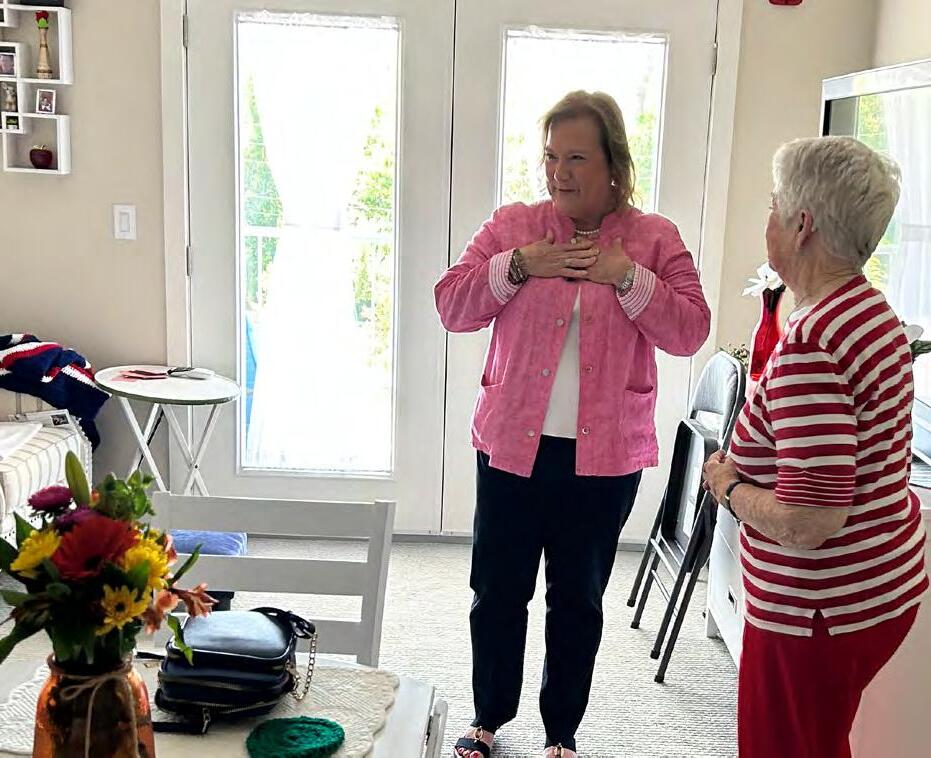
Read more about Ms. Jane, and her interview, on page 11.
NAME
FAVORITE SEASON OF THE YEAR?
Winter (is coming!) fun fact: FSLA's 2019 conference theme was Game of Thrones
WHAT IS A HIDDEN TALENT OR HOBBY THAT YOU BRING TO YOUR WORK?
Whiskey + Cigars... as every successful lobbyist should!
WHAT IS THE BEST PIECE OF ADVICE YOU'VE EVER RECEIVED?
Always say less than necessary!
IF YOU WERE A JUNGLE ANIMAL, WHAT WOULD YOU BE AND WHY? He didn't miss!
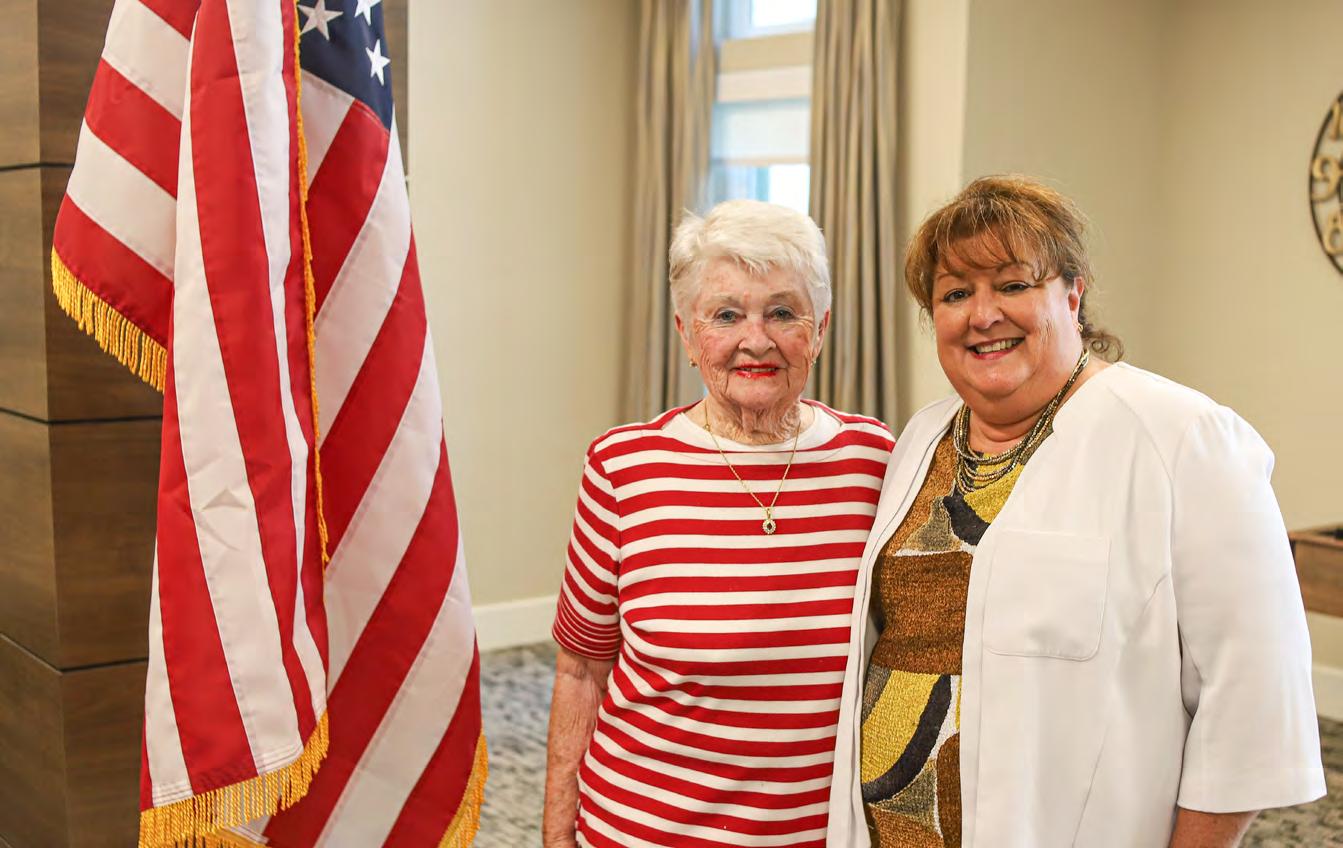
By Katherine Upton
Many senior living communities are proud to house American heroes – veterans who bravely served our country. But the cost of senior care can be a burden, especially for veterans on fixed incomes- This is where Patriot Angels steps in. Patriot Angels specializes in helping veterans and their spouses navigate the application process for a vital benefit: Aid and Attendance. By unlocking this financial assistance, Patriot Angels empowers veterans to access the care and support they deserve, while allowing your senior living community to welcome these esteemed residents.
Florida Senior Living Association is a proud partner to Patriot Angels and the truly amazing work they do to serve seniors. The Veterans Aid and Attendance program can significantly reduce the financial strain of senior living, allowing veterans to receive the care they deserve without depleting their savings.
In a recent Spring visit to Orlando, the association team alongside founding Board Member and Patriot Angels’ Mary Sue Patchett, had the pleasure to interview a recipient of Patriot Angels’ Aid and Attendance Benefit, who lives in an FSLA member community, the Landings at Gentry Park. Jane Westlake is a proud recipient of Patriot Angels Veteran benefits, as the widowed spouse of a former Marine Veteran, Larry Westlake
We were lucky to get the chance to sit down with the lively Ms. Jane Westlake. At 83, Jane is adamant that she does not feel her age and could not say enough positive comments about the community that she calls home. As she explained how she has been a resident since the community opened, Jane added that she is also a proud ambassador. Jane enjoys her days playing mahjong, solitaire, going on solo walks through the lovely outdoor space, and crocheting her favorite symbolthe American flag. Jane elaborated on her patriotic crochet work, “I like it because it’s something that I believe in, so that’s what I do”.
Jane and Larry Westlake had three sons together, who helped to coordinate Jane’s application and benefits with Patriot Angels. Jane is the perfect testament to how deserving seniors can reside comfortably in a safe and beautiful community, with the help of the Patriot Angels team. Florida Senior Living Association is honored to work alongside this impactful organization to make a difference in the lives of seniors, and proud to name Patriot Angels as FSLA’s 2024 Industry Partner of the Year.

I
started Patriot Angels to make a difference. To be that company out there that was there really and truly to serve our veterans and their widows. We exist to lead the change to protect the vulnerable."
Suzette Graham, CEO, Patriot Angels

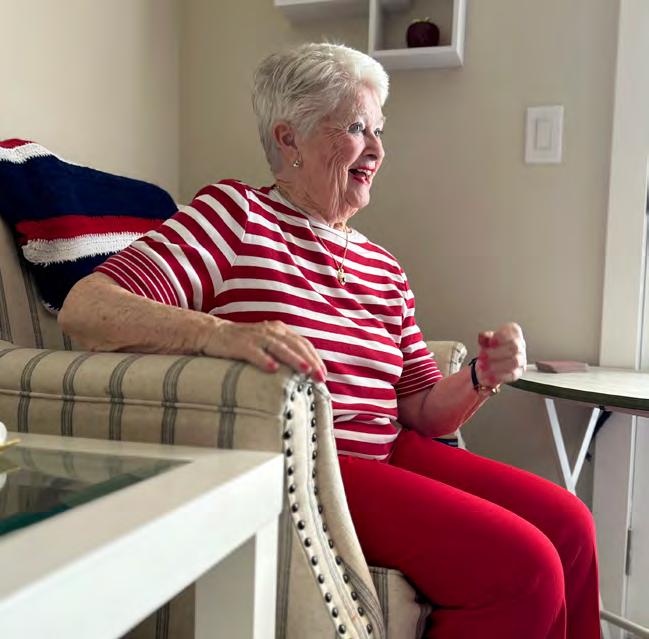
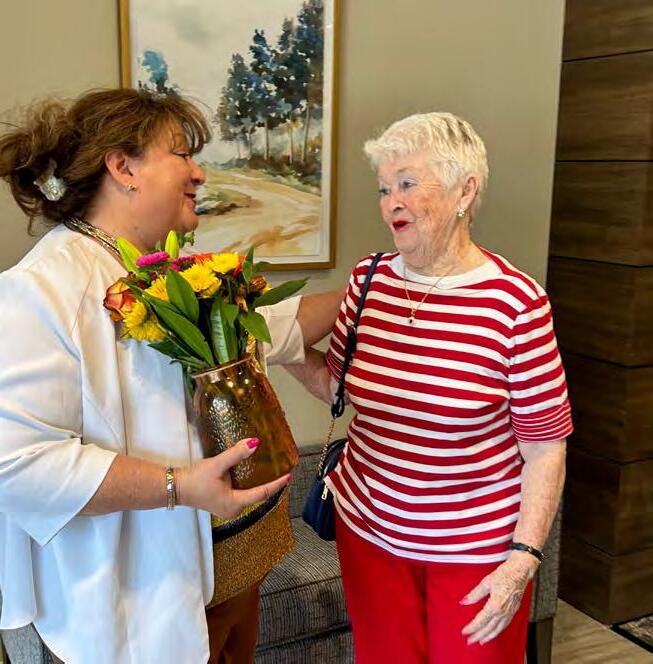
"Patriot Angels thoroughly screened my Vietnam Veteran brother to ensure his eligibility. They then took a daunting application process and broke it down into structured, manageable steps, with guidance along the way. Each of our emails and phone calls received a prompt response and all our questions were thoroughly answered. The staff were compassionate and professional. We received the good news about my brother's Aid and Assistance funds 4 months after applying, well within the time frame that Patriot Angels estimated. We enthusiastically recommend Patriot Angels!"
-Pat
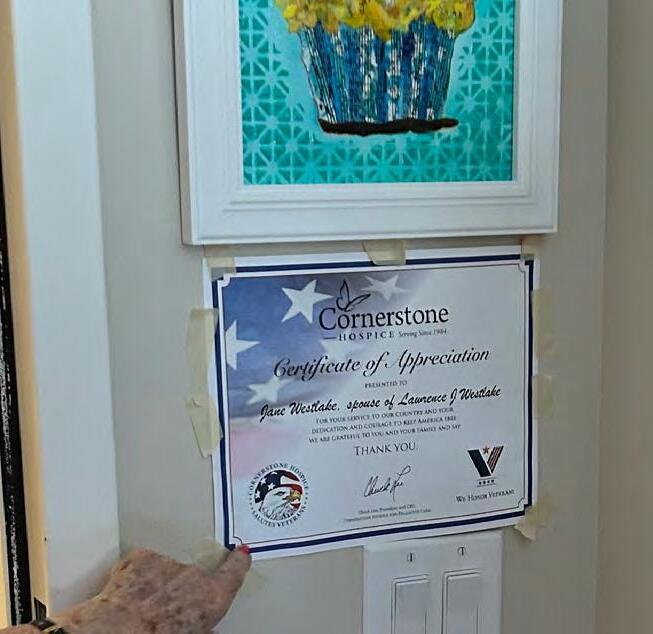
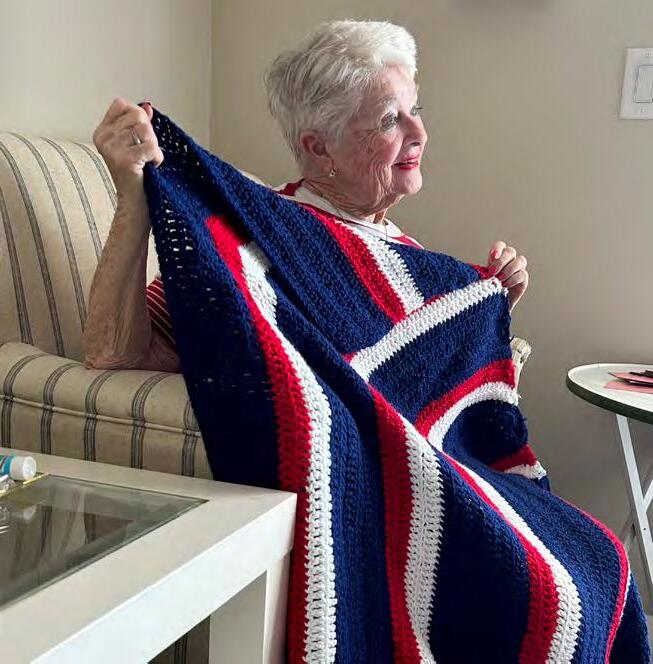
"Patriot Angels is a truly awesome organization! They made the process of getting veteran spousal benefits for my grandmother practically stress-free. All I had to do was provide them with the documents needed and Patriot Angels did the rest. They were always great at answering any questions I had, and they filled out and filed all the lengthy paperwork for me. Within 90 days of starting the process with Patriot Angels, my grandmother was receiving her monthly benefit from the VA. Everyone I talked to at Patriot Angels was extremely nice, knowledgeable, professional, and helpful. I highly recommend taking advantage of this fantastic organization."
-Johanna
"My family and I are so grateful to Patriot Angels for assisting us in applying for VA Aid and Assistance benefits for my 96-yearold mom who recently moved into assisted living. Thanks to their help, Mom was able to qualify for aid, which allows her to live in a qualified facility close to family members. Patriot Angels deserves to be called angels!"
-Diane katherine upton Director of Education & Engagement, Executive Editor of ENGAGE Florida Senior Living Association



Aid and Attendance is a VA pension program designed to help supplement the cost of long-term care for Veterans and their spouses that meet specific VA requirements. This pension can be used to offset the cost of long-term care and make senior care more affordable than ever!
Our team of advocates are devoted to helping Veterans and their Surviving Spouses. We have developed a process that cuts through the VA’s red tape in order to help Veterans and their loved ones receive the VA’s Aid and Attendance benefit. Under the supervision of a VA accredited attorney, our Veterans are provided with quality guidance throughout the application process.
“Patriot Angels is a major game-changer! My Dad is a Silver Star and Purple Heart recipient earned while serving in the Korean War with the Marines. I will always be profoundly grateful to Patriot Angels for their rapid assistance in helping my parents get the financial help they needed to move into an assisted living facility.”

By Katherine Upton
Florida Senior Living Association (FSLA) is excited to announce the launch of the Florida Senior Living Institute Education Website, the association’s brand-new online platform packed with resources to help you rock your role in senior living.
FSLA has continually prided itself on providing amazing professional development. Now, with FSLA’s new educational platform, we are kicking this up a notch. This will include:
Valuable CE credits: The online programs offer Continuing Education credits, helping you fulfill staff licensing requirements and demonstrate your commitment to ongoing learning.
A diverse course library: Explore a wide range of topics vital to senior living, from dementia care and fall prevention to resident engagement and effective communication within your team. Whether you're new to the field or a seasoned professional, there is value for everyone.
Continuously updated content: Stay on top of industry trends, best practices, and the latest regulations with the regularly refreshed course library. We're dedicated to providing you with the most relevant and up-to-date industry information available.
Unmatched flexibility: Don’t stress about fitting into a rigid schedule! FSLA’s new online platform allows you to learn anytime, anywhere, at your own pace. Fit professional development seamlessly into your busy life, whether it's during a quiet break in the community or within the comfort of your own home. If you miss a live FSLA webinar, you can now easily rewatch it on your own time.
User-friendly interface: The platform is designed with ease of use in mind. Navigate effortlessly through the course catalog, track your progress, and access learning materials with just a few clicks.
This website is a game-changer for FSLA members. Why? Because it lets you:
Level Up Your Skills: Stay ahead of the curve by learning about the latest and greatest in senior living.



Boost Your Career: Build your skillset and open doors to new opportunities within your community.
Gain New Knowledge: Deepen your understanding of best practices to provide amazing experiences for all residents.
I encourage you to dive in and explore all that the new Education Website has to offer. It's a fantastic way to keep learning and growing in your career. Scan the QR Code to begin browsing the new course catalog!

If you have any questions about the website or FSLA educational resources, please do not hesitate to reach out. Happy learning everyone!
katherine upton Director of Education & Engagement, Executive Editor of ENGAGE Florida Senior Living Association

By Gail Matillo
Paul Williams, the Vice President of Government Relations for Argentum, has significantly impacted the senior living industry for the past 25 years, playing crucial roles in advocating for and supporting the development and operations of highquality senior living communities.
Recently, FSLA’s CEO Gail Matillo and Director of Education and Engagement Katherine Upton interviewed Paul about his role in the history of Florida’s assisted living communities, including his service as the first CEO of the Florida Assisted Living Association, back when the organization was managed by a former law and lobbying firm located in Tallahassee. The following is an excerpt of the interview.
PAUL: I was very fortunate to have been in Florida near the beginning of when the assistive living care plan as we know or the model that we know today came about. Gail, since you were also there during the early days, I think you'll remember at the time when I started in the early 1990s, we were referred to as Adult Congregate Living Facilities (ACLFs). In the past 30 plus years, ALFs have undergone a complete metamorphosis. I remember one of the first bills that the association passed was changing that nomenclature to Assisted Living Facilities, which we still have today.
But really my experience came when I was working at a lobbying firm in Tallahassee. I had done some internships when I was at Florida State University getting my master’s degree and one of the clients at this firm was a fledgling Florida Assisted Living Association. At that time, they had just enough members to invest in legislative representation, so they hired the law firm I worked with to represent
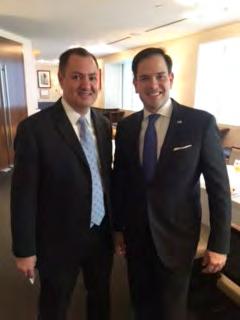
them before the legislature and executive agencies. We also planned and held their board meetings. So, not only was the industry beginning, but certainly the association had just started at that point too. At that time, the members were entrepreneurs and caregivers that started maybe one, two at most small homes.
GAIL: Paul, what kind of issues were you facing back then?
PAUL: Well, how to make sure that consumers were living in safe places. One of our big struggles was not being lumped in with and being regulated as nursing homes. I think a lot of legislators at this time really felt like we were kind of a light nursing home model. They just didn’t know, so that was the focus at the beginning. And, at that time, Florida-based providers for the most part were small homes. Then, the first couple of multi-state operators started communities in Florida. They have created numerous buildings not only in Florida but throughout the country and some still participate in the Florida Senior Living Association (FSLA) board leadership. One of the best stories about assisted living is that you still have operators I began with
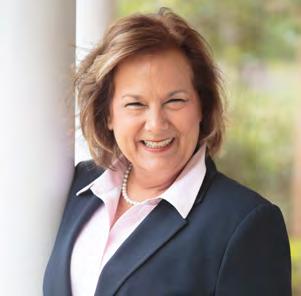
gail matillo, mpa President/CEO, Florida Senior Living Association
almost 30 years ago – Mary Sue Patchett and Gwen Thibault, to name a few. So many, again, have stayed in the business and seen all the changes you and I have seen over the years. Really, I think these first operators have been one of the best things that's happened to our industry.
GAIL: You're absolutely right, Paul. I’ve had the pleasure of hearing some of their early stories and they were amazing. Being in this business is really a rewarding experience. So, Paul, it sounds like the business model, while it has remained the same, has also changed quite a bit. Now, we have more than 3,000 ALFs in the state representing about 116,000 resident beds.
PAUL: Yes, I would say that it’s changed quite a bit. We now have a wide range of owneroperator types in Florida. Some of them are independently owned, some of them are corporately owned, and some of them are owned by REITs.
In the beginning, in many cases, it was owner-operators who took their retirement money and said, “hey, I want to do something to care for seniors where they don’t have to go to an institutional level of care.” Certainly, there are more services and amenities we can offer them than probably what was offered in board and care homes back in the day.
So, I was certainly struck early on by the fact that many operators came from all walks of life, not just healthcare. ALFs were born out of a very entrepreneurial, hands-on approach. What a great thing to say about an industry that is now booming since this model has become so successful and demonstrated not only that it’s a stable industry but probably more important is the ability to expand to get to the next level of communities that we're going to need both now and in the future.
What is most unique about our profession is no matter who the investors are, operators are still the ones at the end of the day who are accountable and make daily decisions for the benefit of their residents.
GAIL: This is still a young industry, even though 30 years seems like a long time.
PAUL: I think it is. I mean, most nursing
homes were created after the passage of Medicare and Medicaid in 1965 – that’s about 60 years. So, to me, ALFs are still young and evolving. If you look at when assisted living really started forming in the late 80s, early 90s, they almost had 30 years of operating as a health care model and I could say the same thing about home health too because home health has been around for an awfully long time.
What is unique is that most nursing homes are funded by the government, and I think ALFs purposely wanted to keep this business a predominantly private pay model so they would be able to make decisions to make residents quality of life and experience better. There are still some growing pains as you would expect for any industry that is maturing but still very young as far as experience goes.
GAIL: Let's go back to the association side of things. Can you give us a timeline?
PAUL: Yeah, I'd say that the late 80s is when you started hearing that terminology and you saw kind of that transition from boarding care to some of the boarding care operators that were in the business and they said, hey, we want to have communities that are able to provide more services, but also to have the quality of life and service amenities we know seniors want. I remember one of the first things I worked on with the association was the extended congregate care specialty care license that Florida had.
Back then, Florida was about the only state with that license. This was a responsible movement by the association's leaders to say, “hey, if you're going to go out and advertise that you are going to specialize in caring for seniors that have Alzheimer's or related dementia, you're going to have to do more than just hang up a shingle and say you do. You're going to have to go through some parameters and define that.”
That was one example of looking beyond just the enhanced quality and services and recognizing the care that was needed for Alzheimer's and dementia residents. And one of the bigger achievements was the Medicaid waiver that was finalized in the late 90s.



So, to me, ALFs are still young and evolving.



We have to be able to grow to meet their growing needs and demands.

That was big because Florida was probably one of the first of the states that had a program where those that qualified financially and who needing nursing home level of care would be able to live in an assisted living community and get their care needs met and obviously live in a home like setting.
The success of that program led to nursing home diversion programs because lawmakers both at the federal government and particularly in state government quickly realized this was a win for residents in the quality of life and the services that were available. It also saved then probably 50 to 60 percent of the cost of somebody who would have prematurely been in a nursing home had that program not been there.
GAIL: It’s so interesting that you say that because we are still fighting for those things today. Our members are assisting living communities; they are not nursing homes. They don't want to be nursing homes, yet, you know, we're still trying to convince folks and the media of the differences. It sounds like that has been ongoing education that's been going on since the beginning.
PAUL: Yes, and I'll tell you about the other evolution during your tenure has been to pass legislation to enable more services be provided to seniors. We have to be able to grow to meet their growing needs and demands. So being able to do the things that you've done, like get more limited nursing services and some of the assistive services that are available in people's everyday home, has been a real benefit to residents and communities.
Some of these issues should be a no-brainer, but unfortunately, those were some of the battles you and others have had to fight to get those services. And thank goodness for that, because again, you want to be able to have seniors, have the option to receive their care in the least costly, but more importantly, the most home-like environment.
When I see our challenge, we're going to have to do more of what you're doing every couple of years to be able to get those services in statute and regulation changes so that they're available. And it's just a constant turn and review of being able to make sure that happens.
GAIL: In the last edition of the ENGAGE magazine we interviewed Dr. Keren Wilson, the first pioneer in Oregon to create an assisted living community. During the interview, she said that in the beginning, it was always going to be the
resident's decision on how much risk they wanted to take. And as it turned out, that's not the case today. The residents no longer have that ability with additional laws and regulations in place to ensure resident safety, which is a good thing. Residents like having their own environment, their own apartment and their belongings so it actually feels like home.
PAUL: I think that's a great point. Back when we started, the government was very supportive of residents making decisions about what levels of risk that they were willing to undertake, and we used to have risk agreements in place. For example, a senior who was a diabetic who wanted chocolate cake recognized the risk.
But, I think the tragedy that's happened since we were first involved with the industry is litigation has come to a point where you have to literally take those choices away from seniors who are willing to take those risks.
GAIL: Paul, when you were managing the association through your law firm, how did the decision come about to break off from that law firm?
PAUL: We got to a point of about 100 or maybe 120 members through dues and we knew we could afford a full-time staff, so in 1998 they offered me the position of being their Executive Director.
I would say about the late 90s is when we started having very serious litigation and insurance issues. We had an insurance crisis in 2000. We had many providers that were on the verge of going bare because there was no insurance to be had or the few that were available were completely unaffordable.
So we went through a successful tort reform effort and were able to get some things in that legislation that looked at assisted living differently than ever before. We had insurance companies that came and said, hey, this is what's going on in Florida. And I think that all those disparate interests on behalf of senior living really helped us at the end of the day get a piece of legislation that helped us through a crisis period.
GAIL: I was involved in that effort as well. We called the campaign, “Don't Drop the Ball.” It was an effort put forth by all health care associations to get legislation that passed in 2001. Unfortunately, there hasn't been any other tort
legislation to that extent that has passed since then.
PAUL: Yes, during that time, we also added the extended congregate care and limited nursing service licenses, which makes us able to take care of a frailer senior with more acute needs.
We would not have had a Medicaid waiver if we did not have those two licenses because we would not have been able to provide the services to meet a nursing home level of care, which is what waivers do without those advanced licenses.
GAIL: You did such a wonderful job here in Florida; how did you transition to Argentum?
PAUL: I was intrigued to move to Washington, D.C. because I knew there was a lot to gain by having a national association. I always wanted to have more national experience. I knew there would be some pressures and we're experiencing that.
My job at Argentum is primarily working with state partners like Florida Senior Living Association. We have state partners in 34 states so to work with them, support them in their efforts to make sure that their state regulatory models are strong and avoid federal regulation intrigued me. The most satisfying part of my job is to watch state associations pass laws and regulations because what I think the public and even the government does not realize is that everything you do is always for the benefit of residents.
You know for you to take the reins and to continue to move the industry forward -- my hat's off to you and your counterparts in the states because that is not easy, and your job is more difficult because Florida's the number two state in the country for seniors.
GAIL: Before we end today, please tell us about some of the challenges that we're facing today. I know there's a lot of stuff going on now at the federal level.
PAUL: One of the biggest struggles is with the media. The recent Washington Post stories, New York Times, etc., it reminds me of what happened in Florida about a dozen years ago with the Miami Herald series, “Neglected to Death.” But go look at some of the independent survey agencies out there like
JD Power and US News and World Report; they are seeing satisfaction levels in assisted living that exceed tourism and the hospitality industry. Assisted living is a success story that gets lost.
GAIL: Yes, I remember how the Miami Herald article negatively affected assisted living communities. That’s one reason that the Florida Senior Living Association was created. We worked alongside the legislature for three years on an ALF regulatory bill that passed in 2015.
One of the other things too, Paul, I think we should point out that times have changed. Years ago, folks would take 5-10 years to make the decision whether they wanted to live in assisted living or not. Now, families are making those decisions within 24 hours. That is a real compliment to the great work we're doing in our communities.
PAUL: Three out of four people will need longterm care services and support at some point in their lives. I think that's paramount because if we don't do a good job now, we're going to continue to have calls for federal regulation.
Every operator and their staff must realize they have to be spokespeople and advocates for our industry. That message has to be delivered, because if our operators and their staff are not delivering that message, guess what? Federal regulation.
GAIL: We have to keep up all the good work that we are both doing at a federal and state level. Argentum and FSLA are making huge strides for communities and for the residents they serve. We keep communicating that message every day. Communities that are not members should join and get involved at the state and federal level. Paul, thank you for everything you do. It has been a pleasure knowing and working with you all these years.
PAUL: Thank you. Gail, you’re amazing as well. Always looking forward. And, you know, Florida is always going to be the most special state to me. Thank you for your leadership and to your board and staff for all you're doing to tackle some, quite frankly tough issues. You and I both know it's not going to get any easier, but I'm certainly glad you're there to lead us to where we need to be.
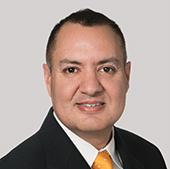
Listen to the companion podcast of FSLA's interview with Paul Williams, Vice President of Government Relations, Argentum.
floridaseniorliving.org/podcast
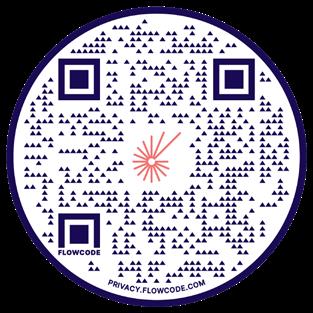
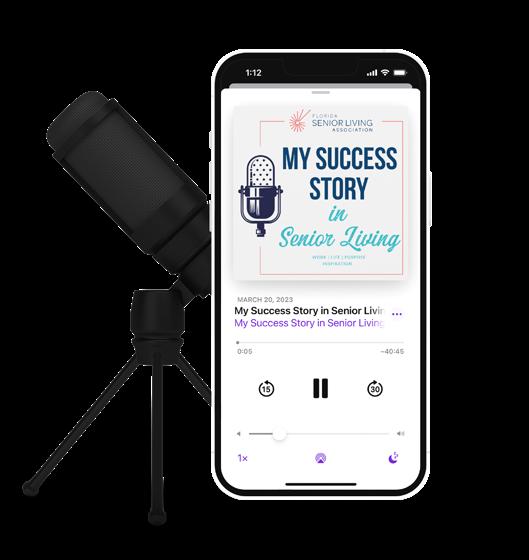
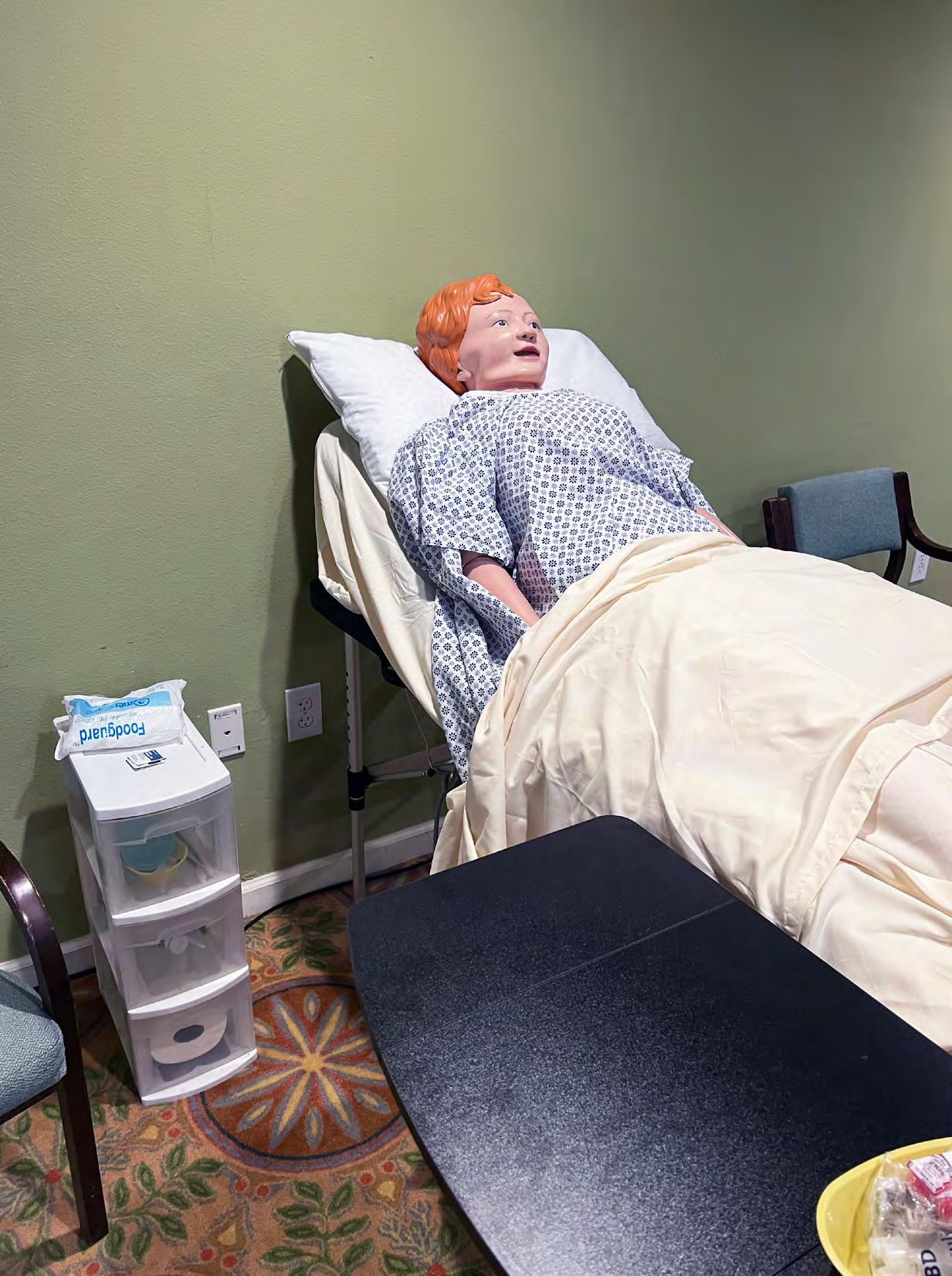

By Lori Barnes, PhD, APRN, ANP-BC
In the dynamic field of healthcare, Certified Nursing Assistants (CNAs) play a crucial role in delivering essential care to patients, particularly in settings like assisted living facilities. Let's explore the multifaceted benefits of pursuing a CNA certification in Florida, focusing on both professional advantages and the positive impact on patient care.
The Vital Role of CNAs
Certified Nursing Assistants are integral members of healthcare teams, providing direct care under the supervision of licensed nurses. Their responsibilities include assisting with daily activities, monitoring patient health, and ensuring comfort and safety.
Benefits of Becoming a CNA in Florida
1. Increasing Demand: Florida's growing population, especially retirees, ensures a steady demand for CNAs across various healthcare settings.
2. Quick Entry and Stability: CNA training programs are relatively short and affordable, offering quick entry into the healthcare field with excellent job stability and growth opportunities.
3. Flexible Work Options: CNAs enjoy flexible work hours and settings, with many opting to work in assisted living facilities for predictable schedules and meaningful patient interactions.
Working in an Assisted Living Facility
Assisted living facilities provide a supportive environment for residents needing help with daily activities but not requiring intensive medical care. Working as a CNA in such settings offers unique advantages:
• Holistic Care Approach: CNAs deliver personalized care that considers residents' physical, emotional, and social needs, fostering a supportive community environment.
• Professional Growth: Assisted living facilities offer opportunities for CNAs to advance their skills through specialized training and certifications, enhancing career prospects.
• Community Engagement: CNAs become integral parts of facility communities, collaborating with healthcare teams, residents, and families to ensure comprehensive care and support.
1. Personalized and Safe Care: Patients benefit from CNAs' personalized care plans and safety protocols, ensuring comfort and reducing risks associated with daily activities.
2. Enhanced Comfort and Dignity: CNAs trained in respectful care practices uphold patients' dignity during intimate tasks like bathing and dressing, promoting emotional well-being.
3. Advocacy and Coordination: CNAs advocate for patients' needs within healthcare teams, ensuring effective communication and continuity of care in assisted living settings.
Becoming a Certified Nursing Assistant and working in an assisted living facility offers a rewarding career path with substantial benefits for professionals and patients alike. CNAs provide vital support and compassionate care, enhancing residents' quality of life through personalized attention and dedicated service. If you're passionate about making a difference in healthcare, pursuing CNA training in Florida and joining an assisted living facility could be a fulfilling choice, promising both personal growth and meaningful impact in the lives of others.

CNAs play a crucial role in delivering essential care to patients, particularly in settings like Assisted Living facilities.

lori barnes, phd, aprn, anp-bc Director of Nursing Education Veritas Nursing Academy
AVAILABLE to member and non-member Florida Assisted Living Facilities. Learning Opportunities Available IN-PERSON and ONLINE
Your employees will learn from the best! Students will gain the skills needed to provide exceptional care, reducing your liability risks and ensuring positive patient outcomes. Exam fees and books are also covered.
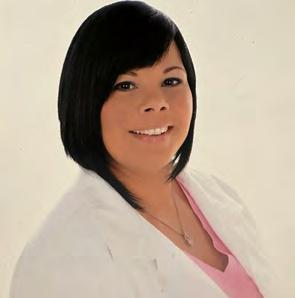


By Kelly M. Smith, CLSSBB, CPHQ
Florida’s older adults have a plethora of options for assisted living opportunities, with over 3,300 currently licensed communities across the state. While some older adults seek assisted living options for socialization and community engagement, many require assistance with activities of daily living, medical care, and medication monitoring to ensure their safety and security. Given the increase in litigation across the sector, proactive prevention of risk has become an inevitable concern.
According to the Agency for Healthcare Administration, there were 2,194 incidents reported within Florida assisted living facilities where a resident experienced a bone fracture or dislocation of a joint, representing 1/3 of adverse events reported for 2023. While older adults are susceptible to the risk of fracture due to several inherent factors, falls are the predominant cause; thus, the creation of a systematic fall prevention approach is crucial, and implementation can go a long way to protect residents and reduce risk.
By definition, a systematic preventive approach is one that is conducted on a regularly scheduled basis, is repeatable, and can be monitored. Proactive, systematic fall prevention begins with team member training. Upon hire and periodically thereafter,
team members should be educated using an interdisciplinary approach relative to what represents normal physical and cognitive aging among older adults so that they can recognize a change in condition, regardless of the department they work in. All team members should be educated on safety protocols, emergency procedures, and who to notify if a change in condition becomes apparent.
Following a resident’s assessment upon admission, all potential risk factors that may predispose the resident to experience a fall, such as physical frailty, ambulatory issues, or potential medication side effects, should be documented in the resident’s personalized care plan. Then, risk factors should be articulated to all team members, including food service staff in the dining room, housekeeping, transportation providers, activity staff, etc. to ensure an ‘all hands on deck approach’ to resident safety. Any change in a resident’s condition must be reported, documented, and communicated to the entire team as well as family members to educate them on the dangers associated with falls.
Finally, a comprehensive risk assessment of the facility’s physical environment should also be conducted on a weekly continued on page 20

basis and include all common areas, resident rooms, and outdoor spaces to identify potential hazards such as uneven flooring, inadequate lighting, or potential tripping hazards. Any identified issues should be corrected promptly.
Preventing risk is everyone’s responsibility and systematic processes promote clear expectations of identifying, communicating, and preventing falls. Assisted living facilities are rapidly becoming the nursing homes of the future with acuity levels higher than ever before. As a result, the population in general requires more assistance. The attraction to a homelike environment that provides a higher level of independence and autonomy than their nursing home counterparts, makes assisted living facilities an appealing option. However, a lack of systematic processes to reduce risk can result in adverse outcomes
for residents, increased healthcare costs, legal liabilities, reputational damage, and regulatory non-compliance.
Implementing comprehensive strategies to mitigate these risks and promote the safety and well-being of older adults in senior living is not only an essential operating component, but also serves as an opportunity to set your facility apart from competitors. Demonstrating a commitment to quality to residents, team members, family members, and visitors that promotes safety, can only elevate a reputable brand. For more information on how to develop systematic processes in your facility and approach quality management proactively, please reach out to Q3 Healthcare | A Division of Saltmarsh, Cleaveland, & Gund at info@saltmarshcpa.com.

Preventing risk is everyone’s responsibility and systematic processes promote clear expectations of identifying, communicating, and preventing falls.

kelly m. smith, phd, clssbb, cphq Q3 Healthcare Consulting, LLC
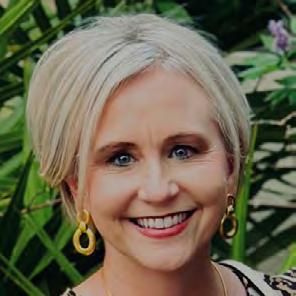
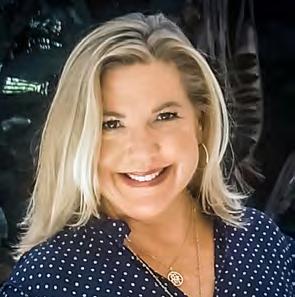
monica wilson, ms ICEBridge, LLC
Have a question about assisted living operations? Ask Monica: Monica@icebridgetraining.com
Can we accept a chest x-ray that was taken two years ago as evidence of a negative tuberculosis examination?
In this instance, a health care practitioner must conduct the examination, and it is up to the health care practitioner to determine how often a chest x-ray is required. Typically, chest x-rays are used when one has a positive tuberculosis test. In these cases, assisted living communities are required to have a health care practitioner’s statement that the individual does not
constitute a risk of communicating tuberculosis. This must be obtained on an annual basis from the health care practitioner conducting the screening.
How long do we have to report background screening status for initial screenings?
Effective January 1, 2024, background screening rosters must be updated within 5 days of initial screening or a change in status, for example, a separation.
Who determines what overthe-counter drugs and quantity are held in stock supply in the assisted living community?
If the community chooses to have a stock supply of over-the-counter drugs, the community determines which drugs and how much stock. Stock medications must be labeled with the medication’s name, the date of purchase and a notice that it is part of the community’s stock supply.


July 10-12, 2024
Ritz Carlton Grande Lakes | Orlando, Florida






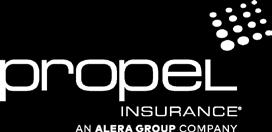






TIME EVENT LOCATION
2pm - 6pm
6pm - 7pm
Exhibitor Registration
Board/Exhibitor Reception
Sponsored by Guardian Pharmacy and Nona Scientific
TUESDAY
Plaza Registration Desk
Tuscany Ballrooms
TIME EVENT LOCATION
6am - 5pm Exhibitor Setup in the Expedition Hall
7am - 8am
8am - 5pm
8am - 11am
WEDNESDAY
Ritz-Carlton Ballrooms
Sunrise Sweat Session Da Vinci Lawn North
Exhibitor Registration Open
FSLA Leadership Academy
Plaza Registration Desk
Speaker: Velma Knowles, Chief Energy Officer, Leaders Pathway, LLC Capri
9am - 5pm Registration Open Plaza Registration Desk
LIONS, tigers & legislation - oh my!
Opening Luncheon; Legislative Forum & Legislative Awards
12pm - 2pm
2pm - 2:30pm
2:30pm - 3pm
3pm - 5pm
Speakers: Jason Hand, Esq., Chief Operating Officer and General Counsel, Florida Senior Living Association; James McFaddin, Partner, The Southern Group; Jim Browne, Former Chief Legislative Aide to the Florida House Majority Leader
FSLA Legislative Award Recipients: FSLA Lifetime Achievement –House Majority Leader Michael Grant; FSLA Senator of the Year – Sen. Colleen Burton; FSLA Representative of the Year – Rep. Ryan Chamberlin
Sponsored by Distinctive Living and ProVisio
hot topics in assisted living General Session; Regulatory Brief
Speakers: Brian Bursa, Founder & Administrative Partner; Kirsten Ullman, Founder & Managing Partner, Ullman Bursa Law
FSLA Leadership Academy Graduation | Bright Young Leader Award Presentation
Speakers: Velma Knowles, Chief Energy Officer, Leaders Pathway, LLC; Gail Matillo, President & CEO, Florida Senior Living Association
unleash your inner roar: lessons from the lion king, broadway's alton fitzgerald white
Opening Keynote
Sponsored by Sensiva Health
6pm Rumble in the Jungle: Silent Auction Opens
Don't miss the amazing items available in our Silent Auction!








Tuscany Ballrooms
Tuscany Ballrooms
Tuscany Ballrooms
Tuscany Ballrooms
Ritz-Carlton Ballrooms

TIME
WEDNESDAY (continued)
6pm - 8pm Ritz-Carlton Ballrooms
8pm - 10pm
Fun Night! Dinner and Entertainment in Expedition Hall
Calling All Party Animals!
The party continues with Live Music by The Jam Band and Jungle Boogie Bar Jungle Boogie Bar Sponsored by Experience Fresh Plaza Pre-function
7 - 8am Sunrise Sweat Session Da Vinci Lawn North
8am - 5pm Registration Open
8:30am - 9am the wild side of senior housing
Breakfast; General Session
Speaker: Justin Hutchens, Executive Vice President of Senior Housing, Ventas
Untamed intelligence: exploring ai in the jungle
Opening Session Presented by Fitz Brumder, WiseOx
9am - 10:30am
survival of the fittest: navigating the intricacies of senior living
Opening Session
Speaker: Robert Kramer, Founder, Nexus Insights / Co-founder & Strategic Advisor, NIC Sponsored by Harbor Retirement Associates
10:40am - 11:30am Breakout Session A
Session 1A
Leadership & Technology Track
Sponsored by ecp
Session 2A operations & regulatory track
Sponsored by Paychex
Session 3A clinical practices/ memory care track
charting affordable trails in the middle market
Speakers:Robert Kramer, Founder, Nexus Insights / Co-founder & Strategic Advisor, NIC; Pilar Carvajal, CEO & Founder, Innovation Senior Living; Joe Jasmon, CEO/Founder, American Healthcare Management Group/Elevate Senior Living
don't monkey around with conflict
Speaker: Robin Khanal, Partner, Quintairos, Prieto, Wood & Boyer, P.A.; Stephen Mistoler, Associate, Quintairos, Prieto, Wood & Boyer, P.A.
Ecosystems & Economics: Providing Value-Based Care
Speakers: Julie Kemman, President, Health Care Professional Consulting Services, Inc.; Alan Fairbanks, President of the ValueBased Care Alliance, Serviam; Mary Henschel, Director of Regulatory & Government Affairs, PointClickCare
Plaza Registration Desk
Tuscany Ballrooms
THURSDAY
Tuscany Ballrooms
Plaza and Tuscany Ballrooms
Plaza Ballroom I
Plaza Ballroom II
Plaza Ballroom III








TIME
Session 4A
Sales, Marketing & Business Development Track
Navigating the Jungle of a Sales Director while Keeping Your Eye On The Tiger
Speakers: Abbey Rocco, Vice President of Sales, Nona Scientific; Matt Rocco, Partner, Sandler Sales Coaching; Susie Carey, COO, SB Senior Consulting Services; Tara Tosh, Regional Director of Sales and Marketing, Charter Senior Living
Tuscany Ballrooms
11:30am - 2pm
2:10pm - 3pm
Exploring the Wild: Meet & Mingle with Fellow Travelers in the Expedition Hall Exhibit Show Open | 11:30am-2pm Box Lunch in Expedition Hall | 12:30pm-1:30pm
Breakout Session B Breakout Session B
Leading the Expedition: Insights from Jungle-tested C-Suite Executives
Ritz-Carlton Ballrooms
Plaza and Tuscany Ballrooms
Session 1B
Leadership & Technology Track
Sponsored by ecp
Session 2B operations & regulatory track
Sponsored by Paychex
Session 3B
clinical practices/ memory care track
Moderator: Shelley Esden, Founder & CEO, Lexor Living
Speakers: : Lindsey Hacker, CEO, ProVisio; Greg Roderick, President & CEO, Frontier Senior Living; Joe Signore, President, Tapestry Senior Living; Joe Jedlowski, Chairman & CEO, Distinctive Healthcare; Michele Thompson, Chief Operations Officer, Retirement Unlimited, Inc.
The Power of Tribe: Exploring Guardianships & Family Dynamics
Speakers: Shawn Harrison, President, SHA, PLLC; Mary Beth Hunt, Long-Term Care Social Work Manager, Community Hospice
Third-Party Wellness in the Wild Drives Business Success
Moderator: Pilar Carvajal, CEO & Founder, Innovation Senior Living
Speakers: Sarah Robertson, National Director of Training & Customer Support, Wellness Services, EnerG by Aegis; Melissa Hale, Chief Operating Officer, Legacy Healthcare Services; Steve Weissblum, Co-Founder and CEO, Troupe Health Partners; Stephanie Bell, Vice President of Clinical Operations Southeast Region, Curana Health
Don't Let it GEt Wild: Trekking the Media Safari
Plaza Ballroom I
Plaza Ballroom II
Plaza Ballroom III
Session 4B
Sales, Marketing & Business Development Track
2:30pm - 4pm
3pm - 3:15pm
3:15pm - 4:05pm
Breakout Session C
Session 1C
Leadership & Technology Track
Sponsored by ecp








Moderator: Mary Sue Patchett, Strategic Advisor for New Business, Patriot Angels; Founding FSLA Board Member
Speakers: Damon Thomas, Senior Vice President of Operations, Providence One Senior Living; Lois Bowers, Editor, McKnight's Senior Living; John Moschner, President, SenCare Management
Reverse Trade Show
Sponsored by Five Star Senior Living
Refreshment/Stretch Break
Sponsored by Elegance Living
Breakout Session C
See the Forest through the Trees: Navigating senior living with expert guidance
Moderator: Aaron Fish, CEO/Founder, Trestle Hospitality Concepts
Speakers: Erin Thompson, Founder Aspire for More with Erin; Anna Hall, Founder, The Purpose Equation
Tuscany Ballrooms
Sienna I & II
Plaza Pre-function
Plaza and Tuscany Ballrooms
Plaza Ballroom I
TIME
Session 2C
operations & regulatory track
Sponsored by Paychex
Session 3C
clinical practices/ memory care track
Session 4C
Sales, Marketing & Business Development Track
3:15pm - 4:05pm
Breakout Session C
Session 1D
Leadership & Technology Track
Sponsored by ecp
Session 2D
operations & regulatory track
Sponsored by Paychex
Session 3D
clinical practices/ memory care track and Sales, Marketing & Business Development JOINT Track
Session 4D
Leadership & Technology Track
Sponsored by ecp
5:15pm - 6:45pm
Hacking the Habitat: Developing for Senior Living's Future
Speakers: Paul Stegenga, Architect, Stegenga + PARTNERS; Monica Marlow, Director of Public Relations, Lake Apopka Natural Gas District; Michelle Pierce, COO, Providence Senior Living
Untangling the Vines: Managing Behavioral Health
Challenges in Memory Care Units
Speakers: Dr. Karla Pena Rosa, Clinical Psychologist, Huntingdon Behavioral Health; Dr. Michelle King, Regional Pharmacy Consultant, Huntingdon Behavioral Health; Dawn Platt, Corporate Memory Care
Winning the Digital Leads Game: It’s a Jungle Out There!
Speakers: Julie Podewitz, CEO & Founder, Grow Your Occupancy; Deborah Howard, CEO, Senior Living SMART & LeadGenie
Breakout Session D
Earn Your Stripes by Taming the Technology Beast
Speakers: Ernie Ianace, President, Amba Health; Gloria Hughes, Senior Vice President, Innovation Senior Living; Jackie Ramieri, CEO, CareWork; Danyele Homer, Head of Customer Success, August Health
The Risk Management Safari: A Hunt for Hidden Dangers
Speaker: Natalie Campaneria, Safety Management Consultant, The MEMIC Group
Jungle Talk: Cultivating Realistic Communication
Moderator: Gwen Thibault, Divisional Vice President of Operations, FL/PA, Legend Senior Living
Speakers: Jennifer Dixon, CEO, JD Solutions Group; Joe Signore, President, Tapestry Senior Living; Elaina Couming, Regional Healthcare Director for Florida, Legend Senior Living
navigating the investment jungle
Speaker: Ben Gelhaus, VP, Investments, Welltower
Chefs' Competition
Speakers: FSLA’s Food Star Shawn McGregor and featuring professional senior living dining chefs all competing for the coveted “Chef of the Year” award and Aaron Fish, CEO/Founder, Trestle
Hospitality Concepts presenting a signature cocktail Sponsored by US Foods and Healthcare Service Group
5:15pm - 6:15pm Cornhole Tournament Sponsored by Pruitt Health
6:45pm Dinner on Your Own
7pm Silent Auction Closes
LOCATION
Plaza Ballroom II
Plaza Ballroom III
Tuscany Ballrooms
Plaza and Tuscany Ballrooms
Plaza Ballroom I
Plaza Ballroom II
Tuscany Ballrooms
Plaza III
Ritz-Carlton Ballrooms
Plaza Pre-function








TIME EVENT
7 - 8am
9am - 10am
Sunrise Sweat Session
Breakfast in the Expedition Hall Coffee Sponsored by Mortellaro Law
10am - 5pm Exhibits Teardown
10am - 10:50am
Breakout Session E
Session 1E
Leadership & Technology Track
Sponsored by ecp
Session 2E
operations & regulatory track
Sponsored by Paychex
Session 3E
clinical practices/ memory care track
Session 4E
Sales, Marketing & Business Development Track
10:30am - 12pm
10:50am - 11am
11am - 11:50am
12pm - 1:30pm
1:30pm - 3pm
Breakout Session E
Don't Take on the Wild Uncovered!
Speakers: Tara Clayton, Senior Vice President, Marsh Senior Living & LTC Practice; JD Swanson, Insurance Executive & Partner, Propel Insurance; Donny Gray, Sales Executive, Plastridge Insurance Agency
braving the administrative complaint safari
Speaker: Amy Schrader, Shareholder, Baker, Donelson, Bearman, Caldwell, & Berkowitz, PC
exploring the wild myths of hospice
Speakers: Bobbie Hoover, Director, Home & Long-term Care Hospice Clinical Services, Community Hospice & Palliative Care; Mary Beth Hunt, Social Work Manager, Long-Term Care, Community Hospice & Palliative Care
Automation Expedition: Attract & Engage Potential Residents effectively
Speakers: Sean Leonard, CEO/ Co-Founder, ActiveDEMAND; Sonia Vachon, Vice President of Sales & Marketing, ActiveDEMAND
Reverse Trade Show Sponsored by HCPCS, Inc.
Refreshment/Stretch Break/Hotel Check-Out
Sponsored by Quintairos, Prieto, Wood & Boyer P.A.
leadership journey through the wild
General Session
Speakers: Kelly Smith, Co-Founder, Q3HC; Jennifer Ziolkowski, Co-Founder Q3HC; Dan Loon, SVP of Program and People Development, Legend Senior Living
best of the best awards luncheon Luncheon Sponsored by: Stegenga + Partners Awards Sponsored by: Welcome Home
paws, claws and ahca laws: ahca regulatory update General Session
Intro: Ombudsman Terri Cantrell, Florida Department of Elder Affairs; Speaker: Kim Smoak, Deputy Secretary, Agency for Health Care Administration
3pm Conference Adjourns








LOCATION
The Da Vinci Lawn North
Ritz-Carlton Ballrooms
Ritz-Carlton Ballrooms
Plaza and Tuscany Ballrooms
Plaza Ballroom I
Plaza Ballroom II
Plaza Ballroom III
Amalfi I & II
Sienna I & II
Plaza Pre-function
Tuscany Ballrooms
Tuscany Ballrooms
Tuscany Ballrooms


4-M Healthcare Booth 31
Accushield Booth 39
Ace Handyman Corp. Booth 52
ActiveDEMAND Booth 5
Adams Keegan Booth 44
Aegis Therapies Booth 35
AFTERDISASTER Booth 79
Aline Booth 53
ALIS by Medtelligent Booth 25
Amba Health & Care Booth 33
August Health Booth 61
Balmoral Senior Living LLC Booth 51
BELFOR Property Restoration Booth 13
Ben E. Keith Foods Booth 78
BlueTeam Booth 11
BMS CAT Booth 8
Brookdale Senior Living Booth 45
CAROLINA SENIOR CARE Booth 82
Century Fire Protection Booth 12
Chattr Booth 85
ClearWellness Booth 48
Concierge Pad Booth 75
Conversion Logix Booth 63
CPH Booth 42
Curana Health Booth 77
ECP Assisted Living Software Booth 59
Empower Me Wellness Booth 68
Florida Natural Gas Association Booth 71
FL Telecommunications Relay, Inc. Booth 72
Forbo Flooring Systems Booth 17
*We regret any changes or omissions due to printing deadlines.
Forum Architecture &
Interior Design, Inc. Booth 41
FOX Rehabilitation Booth 22
Fynn Booth 65
Grow Your Occupancy Booth 6
Guardian Pharmacy Booth 38
H2 Health Prime Living Booth 66
Hercules Outdoor Amenities Booth 56
HPS Booth 18
HPSI Purchasing Solutions Booth 69
Huntingdon Behavioral Health Booth 37
HUR USA Booth 15
KARE Booth 50
Kevala Booth 67
LabFlorida Booth 24
Legacy Healthcare Booth 34
Lightspeed Group Inc. Booth 7
MBI Booth 3
McKesson Medical-Surgical Booth 70
MERI/Genesis Booth 32
Mortellaro
Senior
SeniorLivingGuide.com
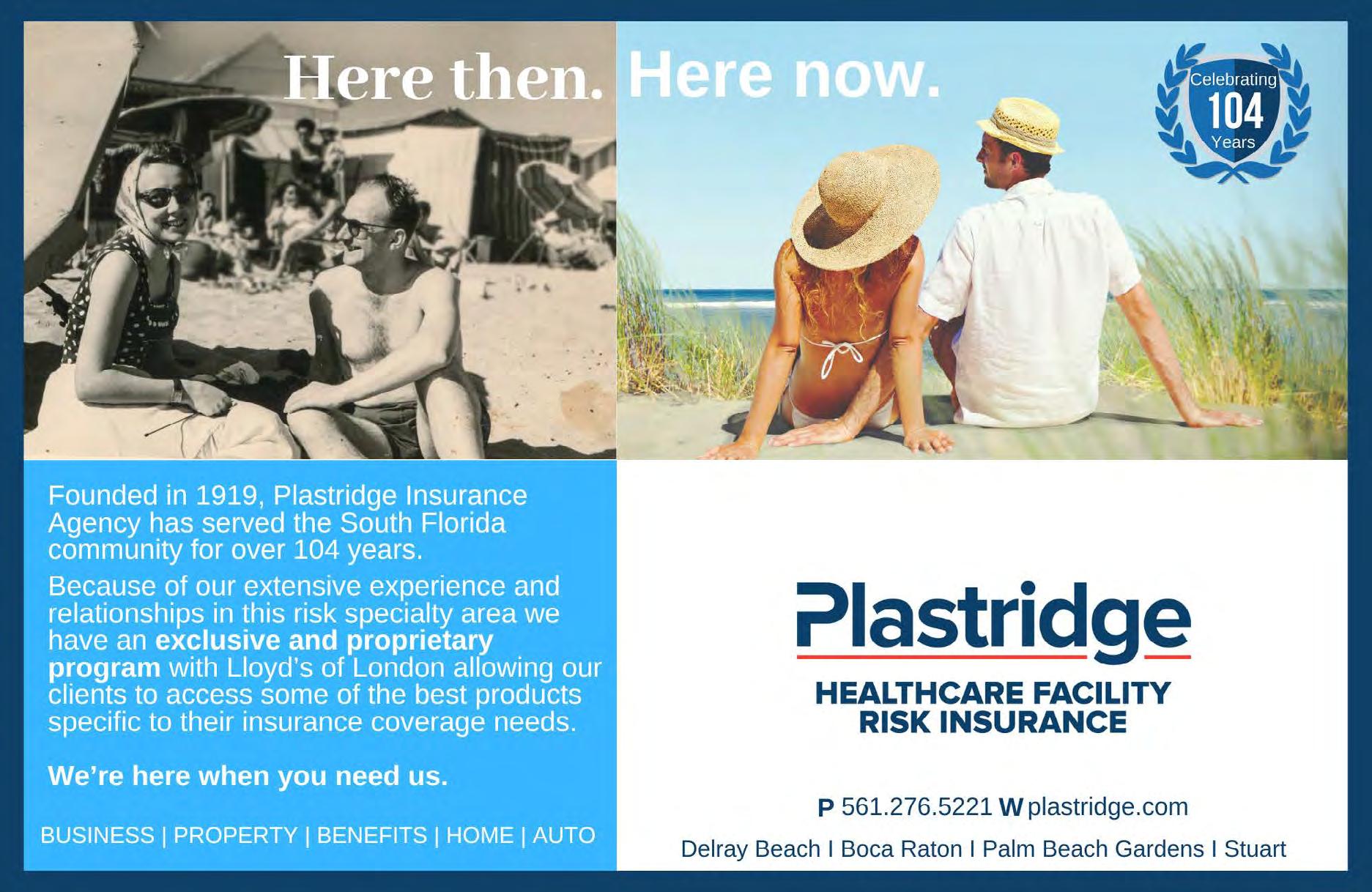


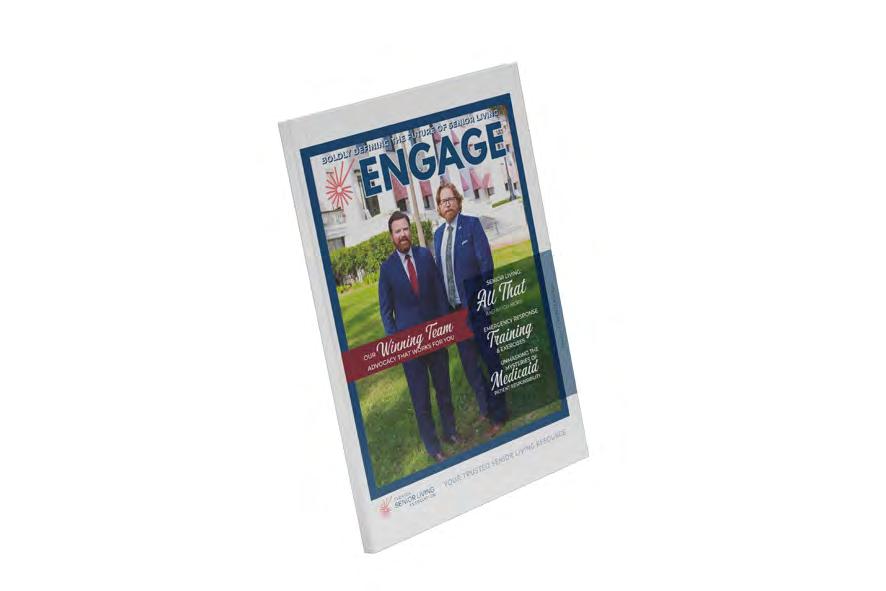


By Jason Hand
In today's dynamic senior living landscape, change is the only constant. This includes the ever-evolving web of rules and regulations that govern how companies operate. From senior living regulations to environmental standards, staying on top of rule changes is crucial for any ALF seeking to thrive. Here are several key reasons why ALFs must pay close attention to rule changes:
The most immediate consequence of neglecting rule changes is the risk of non-compliance. This can lead to a cascade of negative effects, including hefty fines, legal repercussions, and even operational shutdowns. For instance, an ALF that fails to file required daily reporting in HFRS risks AHCA enforcement action!
Rule changes aren't always restrictive. Often, they can present new opportunities for ALFs that are prepared. For example, a shift in ALF CEMP regulations might create an opportunity for your community to review its operations models – perhaps creating additional safeguards for residents and staff while strengthening relationships with local emergency management officials.
Staying informed about rule changes allows your ALF to anticipate and adjust their strategies accordingly. This proactive approach can give them a significant edge over competitors who are slow to adapt. By understanding the evolving regulatory landscape, your ALF can position itself to capitalize on new staff training requirements.
Demonstrating a commitment to compliance fosters trust and strengthens a company's reputation. Customers and partners are more likely to do business with an ALF that operates ethically and responsibly. In today's information age, news of non-compliance can spread quickly and damage a brand's image for years to come.
There are several ways ALFs can stay informed about rule changes. Subscribing to FSLA publications, attending FSLA conferences, and partnering with FSLA legal and compliance consultants are all valuable strategies. Additionally, many government agencies provide online resources to keep businesses updated on regulatory changes.
In conclusion, paying close attention to rule changes is not simply an option for ALFs that want to achieve longterm success. By staying informed and adapting their operations accordingly, ALFs can mitigate risks, capitalize on new opportunities, and build a strong reputation in the marketplace. Remember, a proactive approach to navigating the ever-changing regulatory environment is essential for ensuring your ALFs continuity and achieving sustainable growth. Visit floridaseniorliving.org for more information for how to help ensure your ALFs success! jason hand
COO & General Counsel Florida Senior Living Association

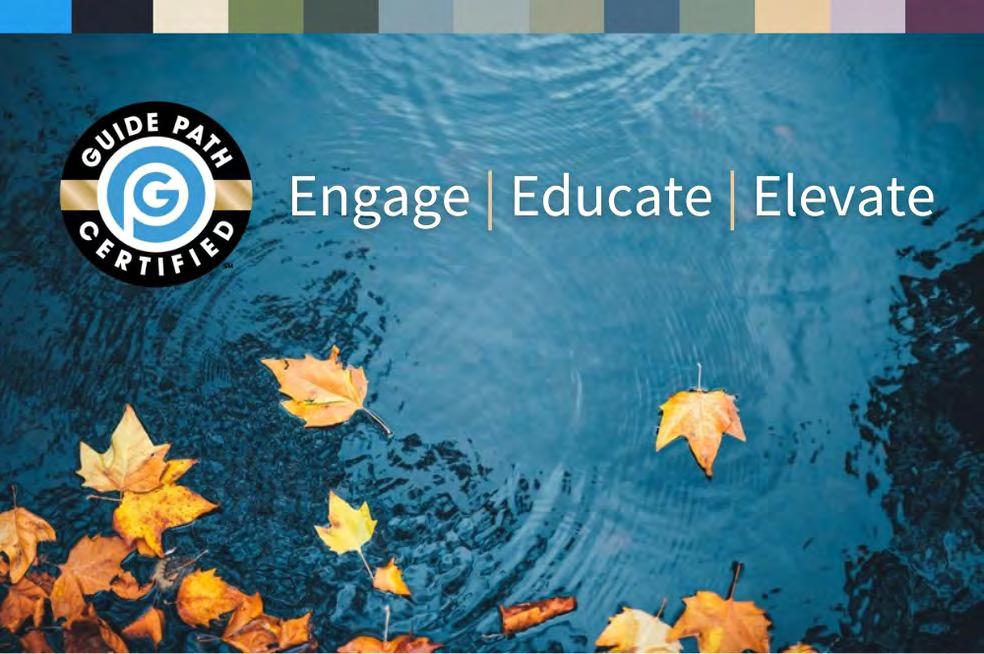
Proactive Risk Management and Culture Change Solutions offered to FSLA Members
By Rebecca Adelman, Esq.
Guide Path, a new innovator of solutions for senior living communities introduces a new collaboration to enhance Senior Living. This partnership introduces the Guide Path national certification program along with the Resident and Family Insights Survey, along with a comprehensive suite of resources aimed at proactive risk and expectations and transforming the senior living experience.
Meeting the Challenges in Senior Living
Senior Living communities today face a myriad of challenges, including rising lawsuit activity and related financial losses. Guide Path addresses these issues head-on through resident and family expectations management and proactive risk mitigation. By setting and managing realistic expectations with proven education and resources, Guide Path helps communities navigate these potential and actual conflicts.
Special Support for FSLA Members
Guide Path extends special support to FSLA members, emphasizing its commitment to the senior living community:
Lower Certification Fees: Offering FSLA members reduced certification fees and reinvesting a percentage into FSLA member certification, demonstrating a strong commitment to
the community’s growth and success.
Discounted Resources: Providing discounted risk management resources for communities, residents, and families with the Insights Survey and related tools, ensuring comprehensive support at every level.
Advocacy: Working alongside FSLA to gain recognition for Guide Path Certified Communities as quality and process improvement and regulatory compliance programs, further enhancing the reputation and credibility of certified communities.
Comprehensive Benefits of Guide Path Solutions
Guide Path offers an array of benefits that extend far beyond basic certification. These include:
Realistic Expectations Management: Through educational programs delivered by senior living subject matter experts and thought leaders, Guide Path helps set and manage realistic expectations for residents and families. This approach significantly reduces misunderstandings and dissatisfaction, fostering a more harmonious living environment.
Empowered Staff and Reduced Turnover: Empowering staff with the knowledge and tools they need leads to reduced turnover and a more stable community environment. Staff
members feel valued and supported, which enhances their job satisfaction and retention.
Leadership and Market Differentiator: Certified communities stand out as leaders in the industry, setting themselves apart with their commitment to quality and excellence.
Reduced Liabilities and Costs: Effective risk management translates to reduced liabilities and lower operational costs, making it a financially sound investment for senior living communities.
Leadership Behind Guide Path
Guide Path was founded by Rebecca Adelman, Esq., who brings over 30 years of legal expertise defending senior living communities in litigation. Her extensive experience in providing risk management, education, and training throughout the country has shaped Guide Path’s comprehensive approach to solving the key risk drivers that have been the source of lawsuits, regulatory complaints, and other losses in senior living.
Certification Programs and Future Support
Guide Path’s certification can be completed at the community’s own pace or through a three-day accelerated program led by Guide Path Specialists, offered monthly starting in July. Additionally, Guide Path is actively seeking
grants to support FSLA members in achieving certification. Importantly, the certification program is accredited for 10.25 NAB and 9.0 Nursing Credits, ensuring that participants receive valuable professional development. Certification lasts two years and includes access to curated resources in the Guide Path Collective, a comprehensive suite of extended learning opportunities designed to reinforce and create deeper culture change and engagement within communities. The first accelerated online certification is July 23-25.

P: 901.201.4553
To learn more about Guide Path and certification, scan the QR code.
rebecca adelman, esq. Founder of Guide Path

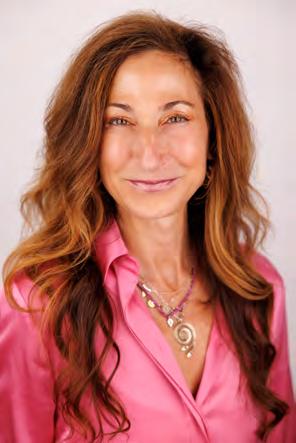

FSLA is collecting recipes, stories and sweet traditions from members and residents for an exciting recipe book project. Help us fill its pages with your favorite family recipes! Scan the QR Code or visit floridaseniorliving.org/recipes
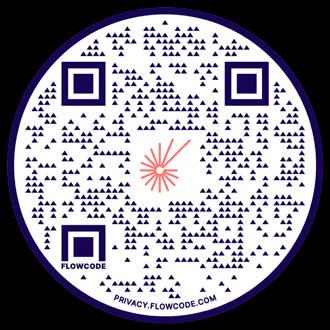

By Aaron Fish
In today's Senior Living marketplace, finding ways for your community to stand out from the crowd becomes critical. There is the need to look at your amenities and ancillary services not just as market differentiators, but also as potential revenue sources. One way that this can be accomplished is by evaluating the value of having and implementing a hospitalityforward beverage program.
Creating a successful beverage program in a senior living community is a multifaceted endeavor that requires careful consideration of several different factors. Things such as resident preferences, quality offerings, staff training, marketing strategies, and continuous engagement are critical for longterm success with any beverage program. We will explore these key elements to help senior living operators develop and implement a beverage program that not only enhances resident satisfaction but also generates revenue.
The foundation of any successful beverage program lies in understanding the preferences of the residents. Conducting surveys and engaging in direct conversations with residents can provide valuable insights into their tastes and dietary needs. For instance, some residents may prefer non-alcoholic beverages due to health reasons, while others might enjoy a glass of wine with dinner. Seasonal preferences also play a significant role; for example, during summer, residents might favor refreshing options like fruit-infused sodas or specialty iced teas. Another factor is understanding residents' ability and willingness to spend their disposable income on such
a program. There is often a fear of “nickel and diming” our residents on ancillary charges that often causes us to avoid pricing services at fair market rates. With most Hospitality operations looking at a 300% markup over cost on their beverage menus, there is ample opportunity to understand what residents can't afford and still generate significant revenues while maintaining below-market pricing.
By gathering this information, operators can tailor their beverage offerings to meet the specific desires of their community, ensuring higher satisfaction and increased consumption.
A diverse and high-quality beverage selection is crucial for keeping the menu both interesting and appealing. This includes offering a range of options such as specialty coffees, teas, fresh juices, and a selection of wines, beers, and spirits. For example, incorporating premium water options like sparkling or infused water stations can encourage better hydration among residents, which is particularly important for older adults who may struggle with adequate fluid intake. Additionally, modern trends such as cold brew coffee and antioxidant-rich juices can be included to cater to contemporary tastes and health-conscious residents. Offering a variety of beverages not only enhances the dining experience but also promotes better health and wellness.
Offering alcoholic beverages does come with some additional thought and planning, especially when considering variety. Trying to develop an extensive wine list, for example, can lead
to significant costs and inventory expenses that may not be wanted or needed. It's better to be strategic with your wine and spirits menus- start small and then add and adjust based on resident demand. Monitoring and tracking your sales data will make this easier for your managers and will also help you better understand the value in revenue generated by your beverage offerings.
Investing in comprehensive training for staff is essential for the success of the beverage program. Staff should be well-versed in beverage preparation, service, and knowledge. This includes understanding the different types of beverages offered, their health benefits, and how to make recommendations based on resident preferences. Effective training programs can significantly enhance the resident experience. For instance, staff who are knowledgeable about the benefits of certain beverages, such as the hydrating properties of infused water or the antioxidant benefits of certain juices, can make informed recommendations that align with residents' health goals.
It's also important to remember that managing alcoholic beverages requires an additional layer of safety training for staff to understand the effects of alcohol on residents and their guests. In addition to concerns about identifying intoxicated residents who have been over-served, there is also a need to understand how certain medications can interact with alcohol consumption. So, it is critical to not only include your culinary and dining team in the beverage training but also to include your care teams and other department heads, so that they can also support and help to keep the operations safe.
A well thought out marketing strategy is vital for promoting the beverage program and driving sales. Utilizing various marketing channels such as social media, newsletters, and in-house events can help highlight unique offerings and special promotions. For example, themed events like a summer iced tea party or a
holiday-themed beverage night can create excitement and encourage participation. Marketing efforts should also focus on the health benefits of the beverages offered, appealing to residents' desire for wellness and healthy living. By effectively communicating the value and uniqueness of the beverage program, operators can attract more interest and increase overall satisfaction.
Continuous engagement with residents is key to maintaining a successful beverage program. Regularly seeking feedback through surveys or informal conversations can provide insights into what is working well and what needs improvement. This feedback loop allows operators to make necessary adjustments to keep the program aligned with resident preferences.
Involving residents in the decisionmaking process can also foster a sense of ownership and satisfaction. For example, hosting tasting events where residents can sample new beverages and provide their opinions can be a fun and interactive way to gather feedback and make residents feel valued. These events will help you better understand inventories and menu opportunities as you are growing and developing your beverage program.
Crafting the perfect beverage program for a senior living community involves a careful balance of these important factors. Senior living operators are encouraged to consider these key points when developing and implementing their beverage programs. By prioritizing resident preferences, quality offerings, staff education, and continuous engagement, operators can create a beverage program that stands out in the marketplace, creates an added benefit for residents, and can help meet the financial needs of the community.


In today's Senior Living marketplace, finding ways for your community to stand out from the crowd becomes critical.


aaron fish CEO & Founder, Trestle Hospitality Concepts
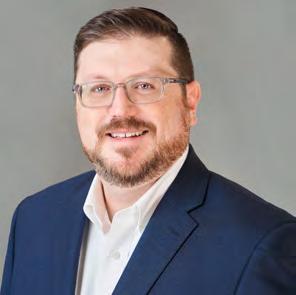
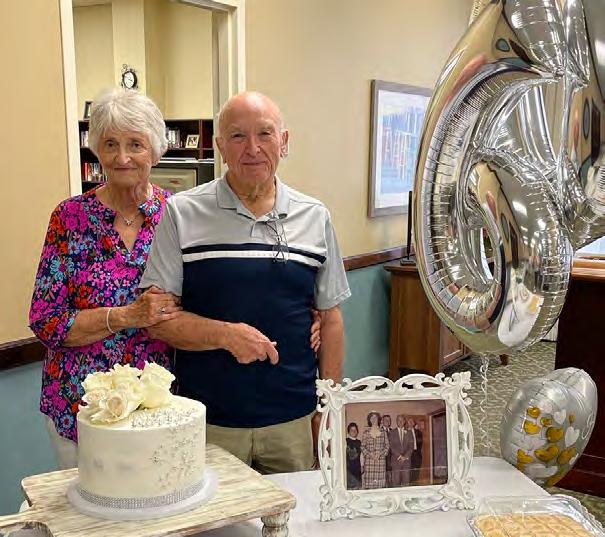
FSLA loves celebrating members and we love celebrating the love between residents!
Residents of Brookdale Senior Living, James and Martha, share six decades of love, laughter, and countless memories. Pictured, the pair celebrated their remarkable 60th wedding anniversary. From the moment they said “I do” to this inspiring milestone, their bond has grown stronger each year. Congratulations on 60 years of endless love!
Brookdale Senior Living was lively with excitement as residents came together to celebrate National Best Friends Day, a heartwarming event that brought smiles, laughter, and an abundance of joy to the residents. This celebration was filled with plentiful laughs, shared experiences, and great friendships, creating incredible memories for all.
The friendships made at Brookdale Senior Living are so special, and the power of friendship was evident as the residents expressed their gratitude for the companionship and support they receive from their friends.
Here are some of Brookdale's Best Friends celebrating together!
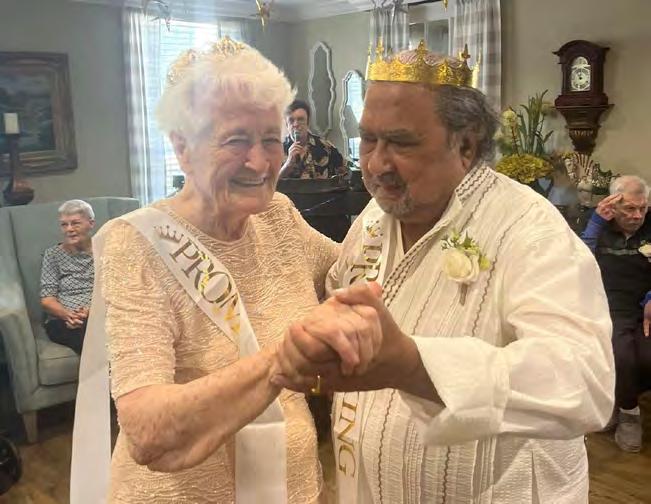
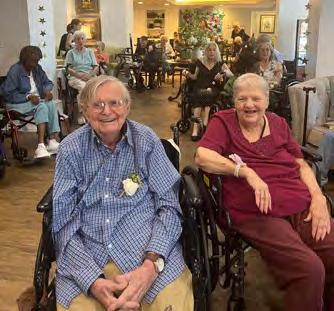
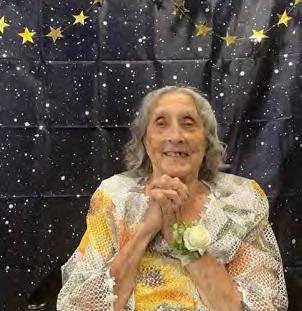
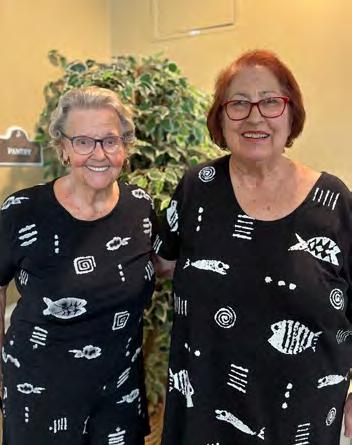
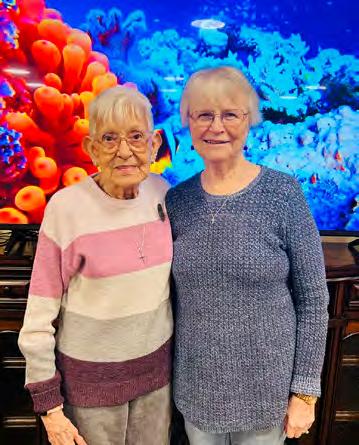
St. Augustine Plantation rolled out the red carpet for a night of glamour, fun, and nostalgia as they hosted a memorable Senior Prom for the residents. As evident from the images, the evening was fabulous, filled with joy, and laughter.
This truly captured the essence of a classic prom night!
Residents arrived dressed in their finest attire, with the ladies wearing elegant gowns and the gentlemen looking dapper in their suits. Everyone gathered around to dance together and show off their sparkles. The atmosphere created by the staff was enchanting.
One of the highlights of the Senior Prom was the crowning of the Prom King and Queen, a tradition that all the residents were looking forward to.
Gulf Specimen Marine Lab visited the community and brought some sea creatures for the residents to meet. The staff and residents enjoyed learning about the sea turtles around Florida and the Mexican Gulf. Some were even brave enough to touch the horseshoe crab!
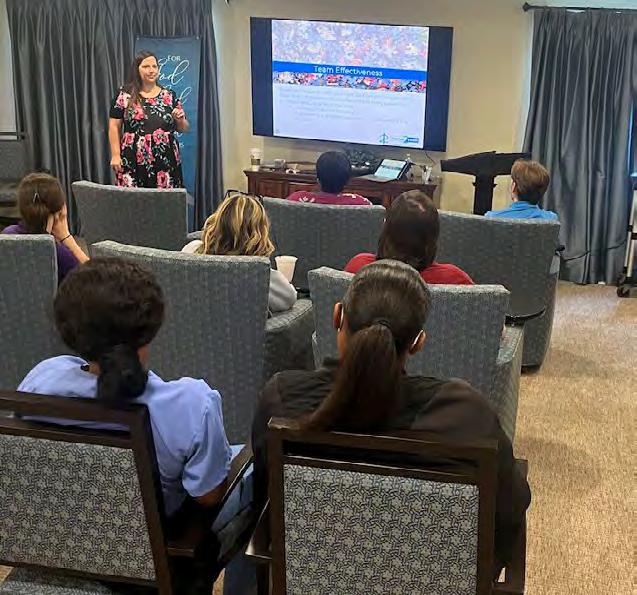
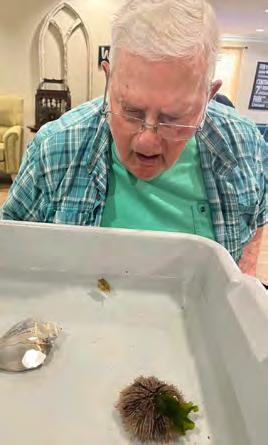
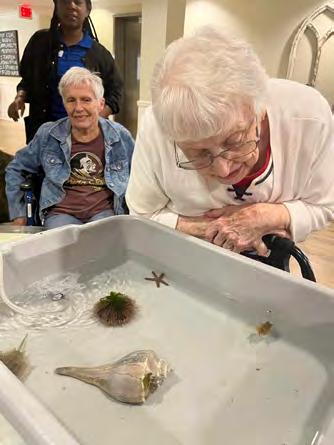
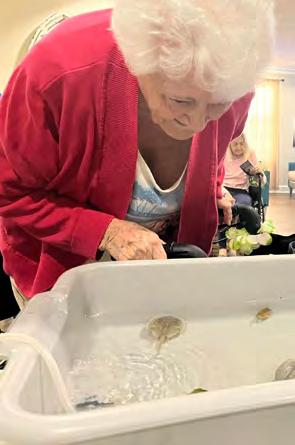
Tapestry Senior Living’s Lakeshore team participated in extensive teambuilding exercises. Tiffany Weigand, MBA, and Partner2Learn guided the team on how to lead with their strengths. FSLA’s Board Member, Joe Signore, President at Tapestry Senior Living stated, “[Tiffany’s] exercises and coaching deepened the ties that this team holds, further developed trust, and challenged them to reach higher levels of performance personally and professionally.”
Joe’s team participated in a variety of activities that challenged each of them to think creatively and collaborate to enhance the team’s efficiency. The Lakeshore team embraced these challenges with enthusiasm and an open mind.
Tiffany and Partner2Learn helped each team member identify their strengths and learn to use their best assets to maximize the efficiency of working as a team. The impact of this team-building exercise has been profound.
FSLA is excited to continue supporting Tapestry Senior Living Lakeshore and their shared commitment to excellence in their community!
This June, Tapestry Senior Living Lakeshore welcomed Amanda Thorson, MSN, BSN, GERO-BC, CMSRN, PHN, C.D.S, LNHA, LALD, as the Vice President of Clinical Operations. The Tapestry team is thrilled to have her on board!
Congratulations, Amanda! FSLA looks forward to supporting you in every way possible as you step into this new role.
kristin quirk, ms
Director of
Membership & Partnership Florida Senior Living Association
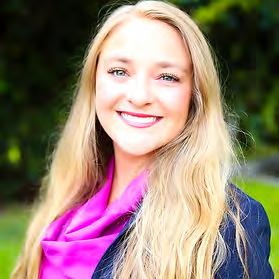
FSLA loves to visit our members! If you would like us to come to your community, please contact Kristin Quirk, Director of Membership & Partnership at membership@floridaseniorliving.org or (850)-708-4972.

By Monica Wilson
Financial scams are a significant concern for individuals of all ages and backgrounds.
The Federal Trade Commission (FTC) reported receiving over 6.1 million fraud reports in 2023, with financial scams accounting for a large portion of these complaints. Criminals are quickly learning to use AI to make scams and cybercrimes more difficult to detect. Older adults are particularly vulnerable and more frequently targeted.
The FBI's Elder Fraud Report 2023 Reveals Devastating Impact on Seniors
According to the latest FBI report, Florida ranks second only to California in the number of reported elder fraud cases, with nearly 8,000 incidents reported to the FBI Internet Crime Complaint Center in 2023 and Floridians over 60 reporting nearly $294 million in losses. This underestimates the true scope, as many cases go unreported due to shame or fear.
The FBI's 2023 report paints a concerning picture of how elder fraud, particularly through illegal call centers, disproportionately targets older adults. While tech support and government impersonation scams represent just two categories of fraud reported, they account for over $1.3 billion in losses across all complaints. The financial burden is
immense, with reports indicating seniors remortgaging homes, emptying retirement accounts, and even borrowing from loved ones to recover from these scams. The emotional toll can be just as devastating.
Investment fraud, cryptocurrency scams, romance and grandparent scams are also among the most common forms of elder fraud reported.
Education and Individual Vigilance are Crucial to Combat Scams
Senior living communities can be a powerful force in combating elder fraud by incorporating education and awareness training into their ongoing programming and providing a variety of resources to residents including:
Educational Workshops: Regularly host workshops and seminars on elder fraud awareness. Invite representatives from local law enforcement agencies, consumer protection bureaus, and financial institutions to speak.
Informative Newsletters and Bulletins: Regularly include information in newsletters or bulletins highlighting current scams, warning signs, and tips for safeguarding personal information.
Technology Training: Partner with reputable technology firms to offer classes on safely using technology, such as identifying phishing emails, spotting suspicious websites, and managing passwords securely. Offer technology training as part of ongoing activity programming to help residents keep up with ever evolving technology.
Financial Literacy Programs: Provide workshops to educate residents to recognize predatory lending practices.
• Encourage residents to be wary of unsolicited calls, emails, or visitors. Advise them not to share personal information or financial details readily.
• Promote communication with family members and trusted advisors. Encourage residents to discuss financial matters and offers with trusted family members or trusted advisors before making decisions.
• Educate residents on the importance of keeping bank statements and financial records secure.
• Advise residents never to send money or wire transfers to unknown individuals or entities.
• Encourage residents to use trusted financial advisors and service providers.
• Extend Cyber Security Training Provided to Staff to Residents.
ROMANCE SCHEMES
Criminals pose online, o en using dating websites or social media, trying to capitalize on one’s desire for companionship. According to the FTC, scammers are requesting cryptocurrency payments – a red flag to potential paramours.
LOTTERY OR SWEEPSTAKES SCAM
It begins with a notice that you’ve won a financial windfall. To claim your prize, you simply pay a small fee.
GRANDPARENT SCHEME
Someone poses as a family member, calling, texting or emailing for urgent help. That urgent help involves an immediate transfer of funds to solve the crisis.
HOME REPAIR SCAMS
Someone shows up at the home saying an emergency repair is needed, but needs payment in advance before remedying the situation.
FAMILY/CAREGIVER SCHEMES
One of the most common involves relatives or caregivers taking nancial advantage of elders.




At JR & Co. we know that a safe and secure roof is essential for the well-being of your community. As a family-owned and veteran-owned company, we bring dedication, integrity, and unmatched craftsmanship to every project. Our team of experienced professionals specializes in roofing solutions tailored to the unique needs of senior living facilities, ensuring that your residents remain safe, dry, and comfortable year-round.
We offer comprehensive roofing services, from routine maintenance and repairs to complete roof replacements of any material. Choose JR & Co. to safeguard your community with the care and excellence it deserves.

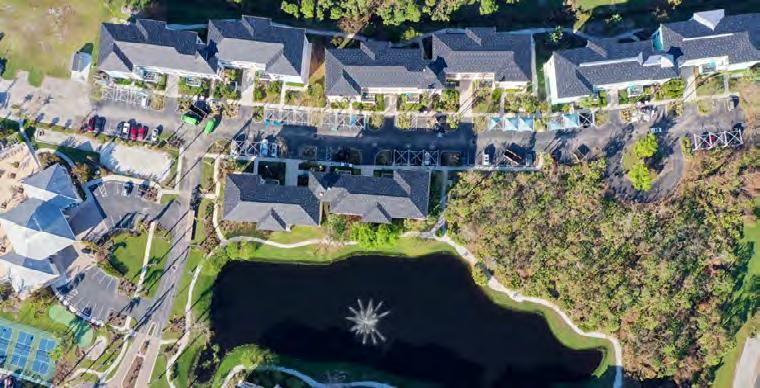

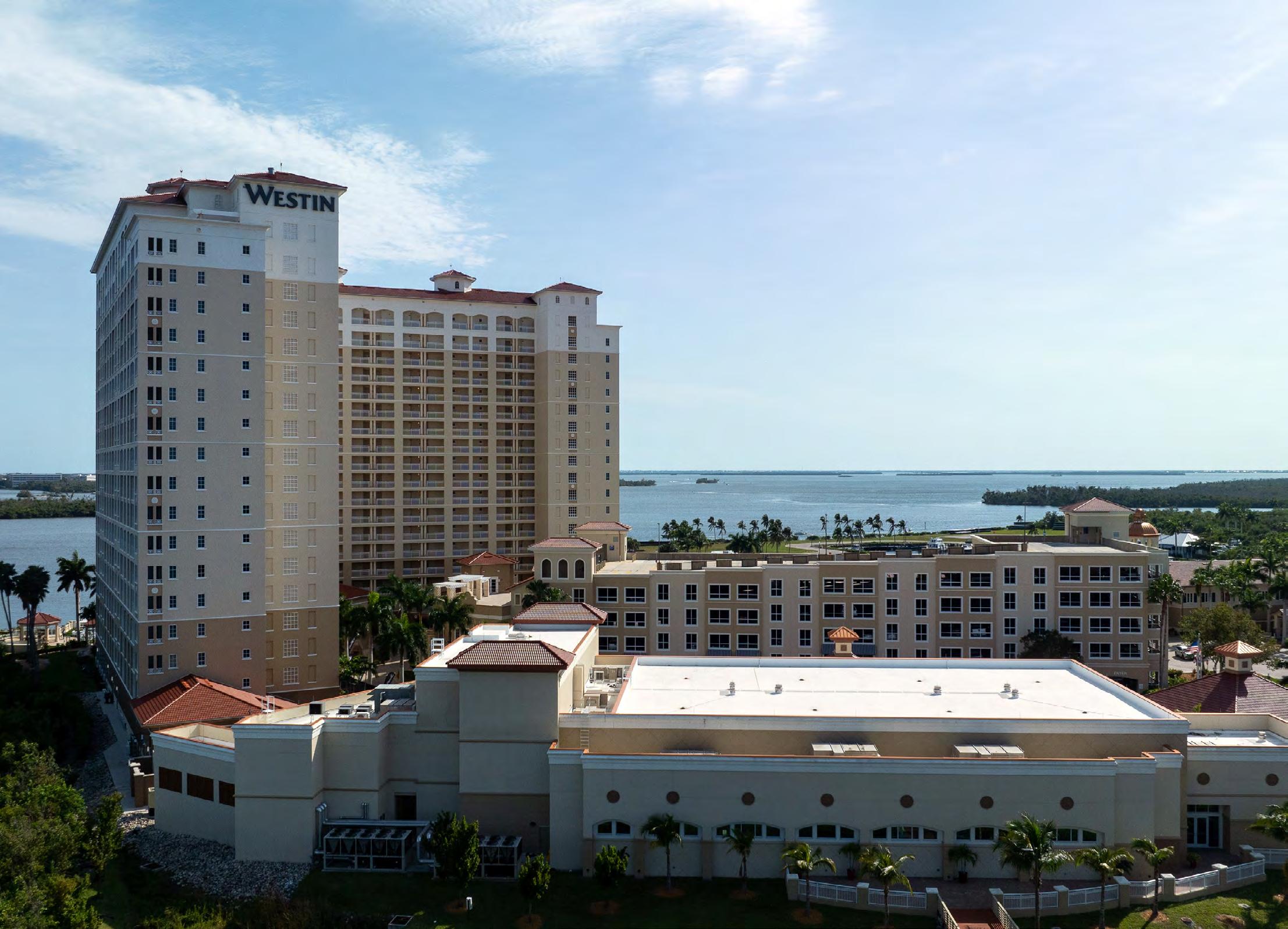
Remember to take advantage of our FSLA Member discounts on JR & Co. repair & service work! Visit www.jrcousa.com/fsla to learn more.
By Sandi Poreda

There’s a story, or possibly a literary myth, about Ernest Hemingway and several writing friends who placed a bet over a luncheon over who could write the saddest story in only six words. Legend has it Hemingway won handily with his contribution: “For sale. Baby shoes. Never worn.”
Whether this actually happened or if Hemingway was the real author of this famous piece of writing may never truly be known. What this story does teach us, however, is that you don’t need thousands or even hundreds of words to make a strong point.
How many of us have read an article or an email that could have easily been half its length, or even a quarter? If you forget the main point by the time you finish the supporting information, the content is too long. When it comes to writing, bigger (or longer) is not better.
Any point you need to make can be made succinctly if you pay attention to the structure of your writing. By employing a few simple tactics, you’ll dramatically reduce your word count and improve the likelihood your audience will understand and retain the information you’re trying to share.
First, keep it simple. Stick to one main point and support material per paragraph. And keep it short. Sentences shouldn’t be more than 12-15 words, and paragraphs should max out at five sentences.
Second, make sure your content is well organized. Writing should act like a road map, moving your audience smoothly from one point to the next without stops or detours. If something is poorly organized, readers will remember confusion and not your message.
Last but not least, be aggressive when making cuts for length and clarity. You may not be able to limit a memo or an important email to just six words, but your audience will thank you for your clarity and brevity.
As you practice this skill, take time every now and then to write your own six-word story. What might start as a strange exercise may end up surprising you with profound meaning.
sandi
poreda, apr
Bulldog Strategy Group, FSLA PR Conultant
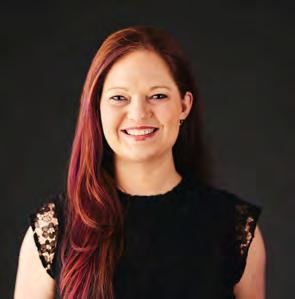
2292 Wednesday Street, Suite 1 Tallahassee, FL 32308
